- Our Centers Delhi Bhubaneswar Lucknow
- My Schedule
- Payment History
- Help/Support
- Profile Settings

Essay Writing
Book my slots, essay writing essentials.
- Free Downloads
How to Write a Perfect and Balanced Essay
- Categories Optional
“It is my ambition to say in ten sentences what others say in a whole book.” -- Friedrich Neitzsche
Essay writing is among those areas in UPSC IAS Exam that can be your savior and improve your marks significantly if worked efficiently. However lack of practice and rudimentary approach may also reduce your marks and jeopardize your chances of selection in Civil services exam . A well-developed approach and rigorous practice can significantly enhance your score in essay paper in UPSC mains Exam . But before delving into the techniques to write a perfect essay it is very important to understand what is an essay and what are its different organs?
What is an essay?
- An Essay Writing is a focused, descriptive and analytical write up on any particular topic. But this is different in format and presentation from any other kind of write up on the same topic.
- An essay is a tight write up which has a certain theme at its core and the write up is marked by its simplicity, lucidity, flow and orderliness.
- It should generally avoid terse and unwieldy expressions, unnecessary exposition and excessive facts, especially numbers.
- An essay is a write up that evolves from childhood to youth and thereafter to maturity.
- An essay should generally reflect the perceptions, understanding, and stance/take of the writer, which may be supported by facts, quotes and findings of similar kinds.
Let's have a look on Vikram Grewal's Copy
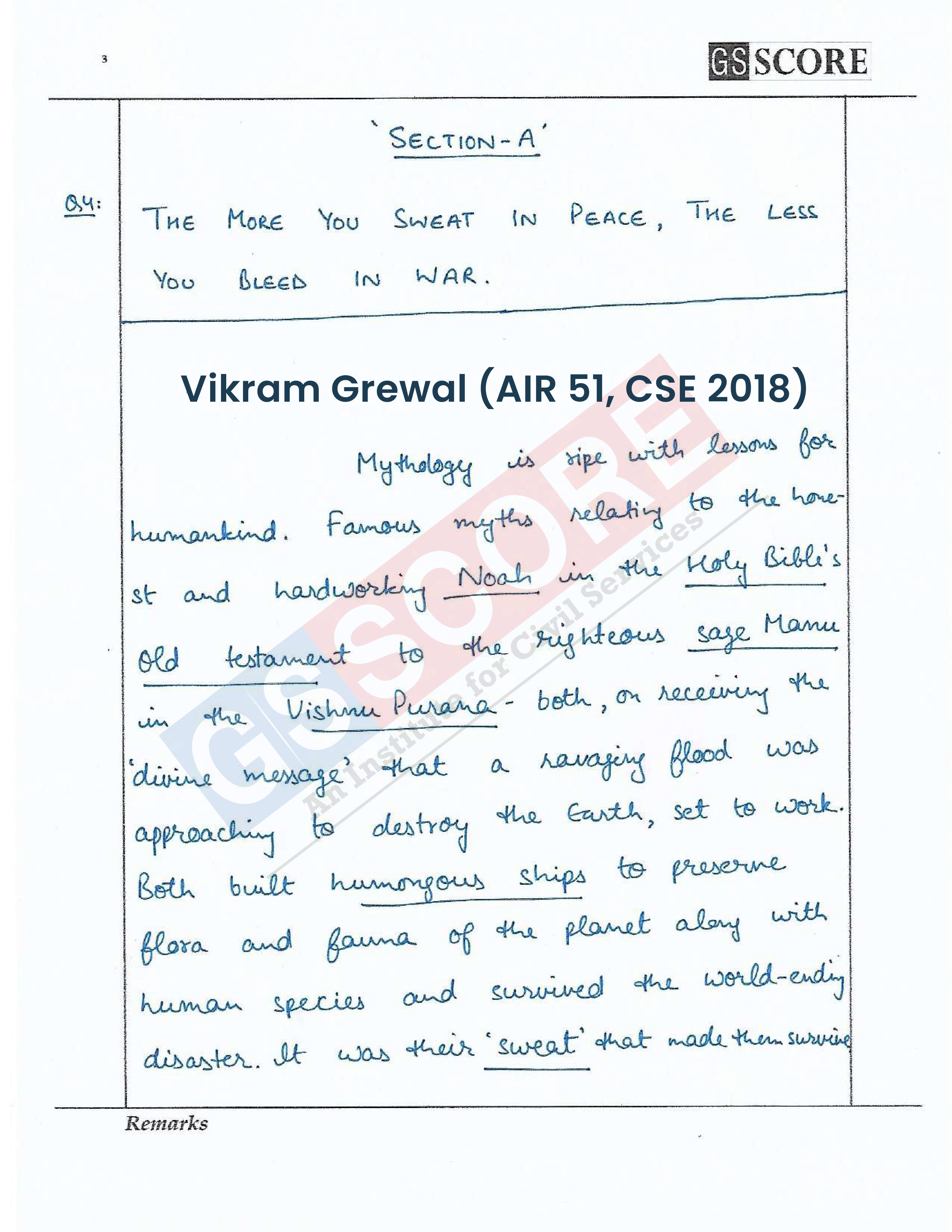
For full copy click here
What an essay writing should not be....
- It should not be a mere compilation of information or facts.
- It should not be a long note.
- It should not be a brief note.
- It should not be a theoretical exposition.
- It should not be a conglomeration of great ideas by great people.
What constitutes a good essay?
A good essay should have three distinct parts-
- Introduction
- Description
A good essay should be close to its subject or theme throughout the write up.
Essay Writing Strategy by Vikram Grewal (AIR 51, CSE 2018), A must watch session for more clarity.
A good essay should reflect...
- Understanding of the writer
- Thoroughness of the writer
- Analytical capacity of the writer
- Research and analytical capability of the writer
- Reading habits of the writer
For Example:
Vikram Grewal's Copy, all the following things are considered by him:
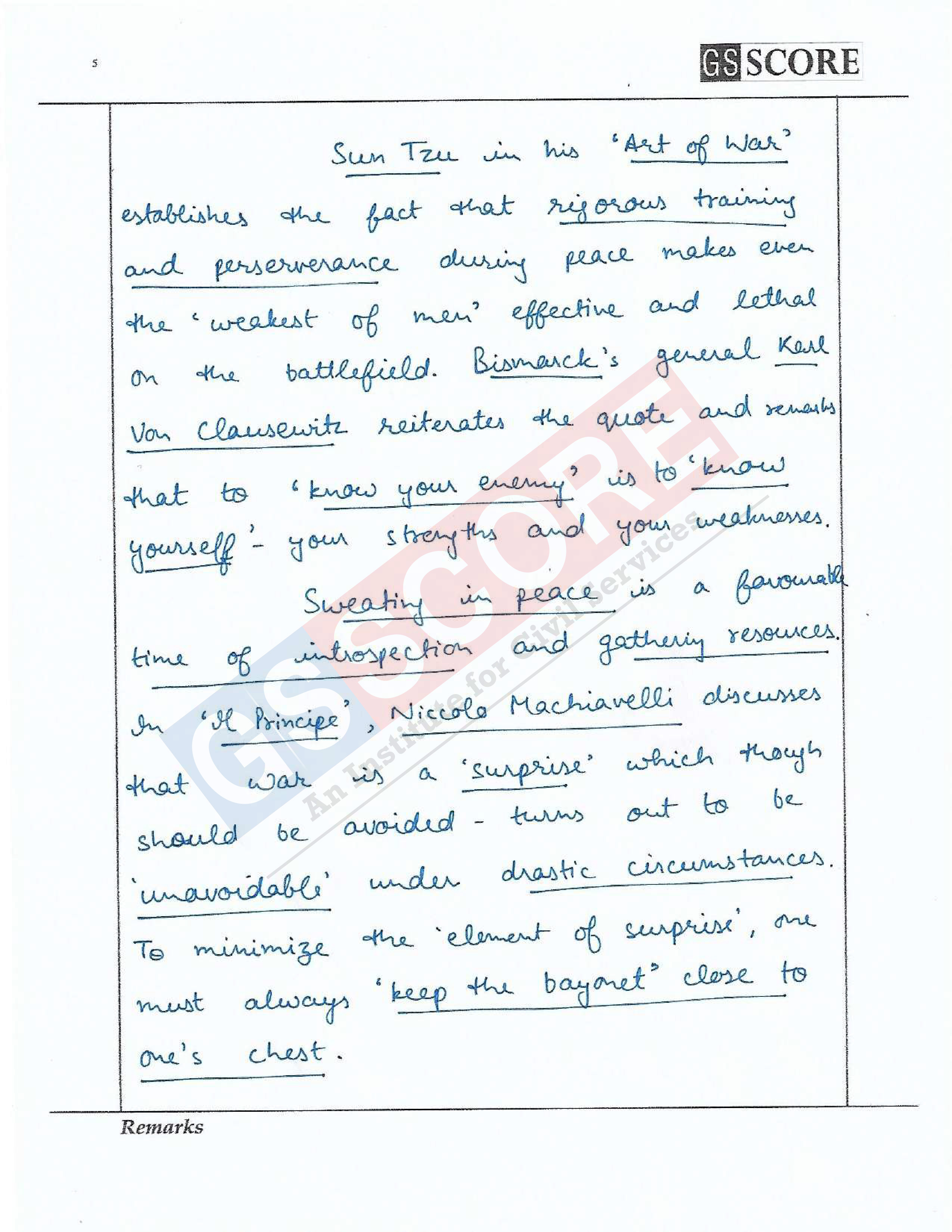
Click Here for Full Copy
Essay needs a higher level of communication abilities viz..
- Articulation
- Effective expression
- Logic, flow and rhythm
- Right grammar
Brief for practicing essay writing – pre exam hall approach.
How to write a good Essay can be viewed sequentially, as if going through ten sequential steps in an essay writing process.
- Research : Begin the essay writing process by researching your topic, making yourself an expert.Assuming you've been given a topic, or have narrowed it sufficiently down, your first task is to research this topic. You will not be able to write intelligently about a topic you know nothing about. To discover worthwhile insights, you'll have to do some patient reading and information gathering. Though IAS aspirants are hard pressed of time but don’t forget it is of 250 marks and highly neglected. It can be done through integration of your daily newspaper reading and through preparation of GS also. But you need some different strategy to do so.
- Analysis : Now that you have a good knowledge base, start analyzing the arguments of the essays/articles you're reading. Clearly define the claims, write out the reasons, the evidence, etc. Look for weaknesses of logic, and also strengths. Learning how to write an essay begins by learning how to analyze essays written by others.
In case of analysis Vikram Grewal shows it perfectly: Here is a look
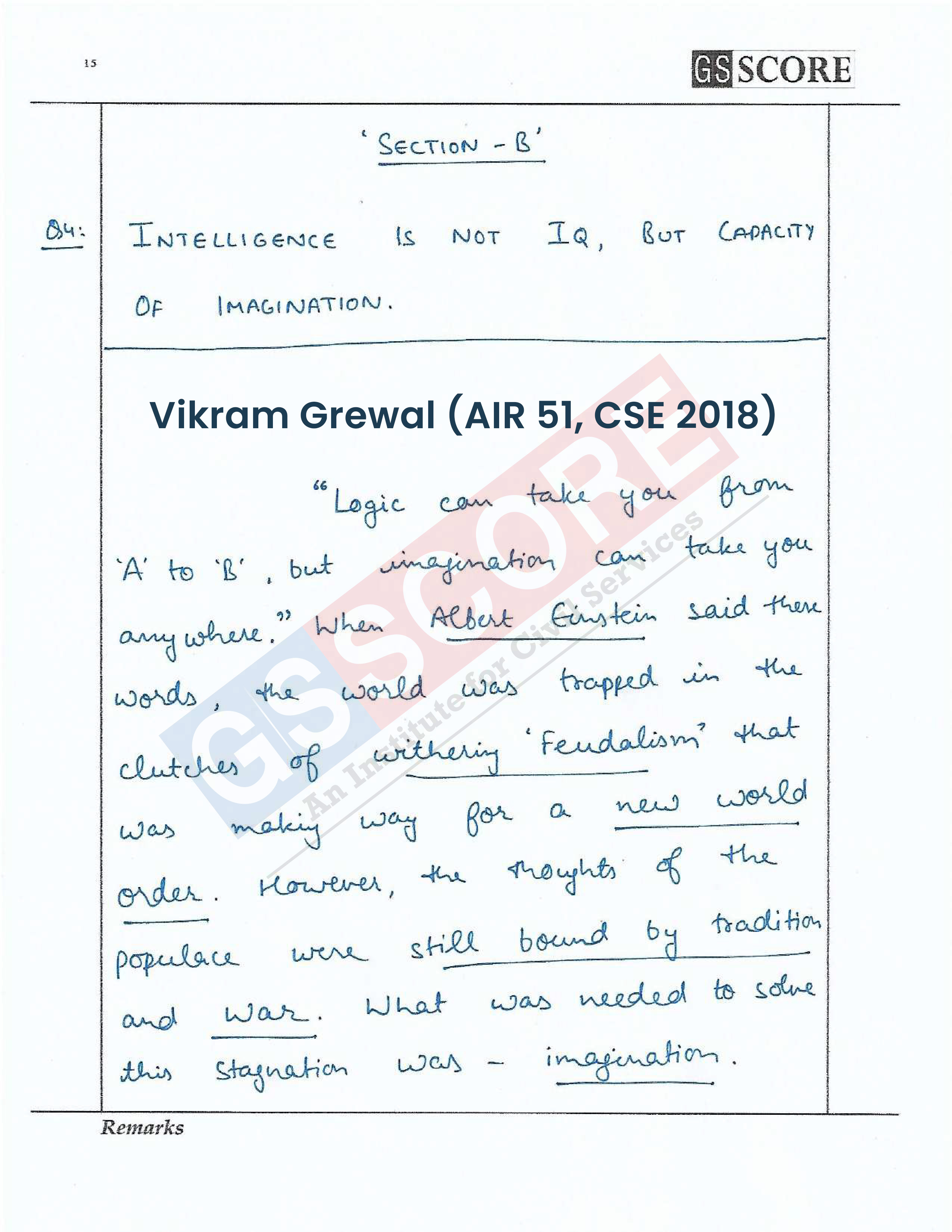
For Full Copy Click Here
3 .Brainstorming : Your essay will require insight of your own. Ask yourself a dozen questions and answer them. Meditate with a pen in your hand. Think and think until you come up with original insights to write about.
- Thesis: Pick your best idea and pin it down in a clear assertion that you can write your entire essay around. Your thesis is your main point, summed up in a concise sentence that lets the reader know where you're going, and why. It's practically impossible to write a good essay without a clear thesis.
- Outline: Sketch out your essay before straight away writing it out. Use one-line sentences to describe paragraphs, and bullet points to describe what each paragraph will contain. Play with the essay's order. Map out the structure of your argument, and make sure each paragraph is unified.
- Introduction: Now sit down and write the essay. The introduction should grab the reader's attention, set up the issue, and lead in to your thesis. Your intro is merely a buildup of the issue, a stage of bringing your reader into the essay's argument.(Note: The title and first paragraph are probably the most important elements in your essay. This is an essay-writing point that doesn't always sink in within the context of the classroom. In the first paragraph you either hook the reader's interest or lose it.)
- Paragraphs: Each individual paragraph should be focused on a single idea that supports your thesis. Begin paragraphs with topic sentences, support assertions with evidence, and expound your ideas in the clearest, most sensible way you can. Speak to your reader as if he or she were sitting in front of you. In other words, instead of writing the essay, try talking the essay.
- Conclusion: Gracefully exit your essay by making a quick wrap-up sentence, and then end on some memorable thought, perhaps a quotation, or an interesting twist of logic, or some call to action. Is there something you want the reader to walk away and do? Let him or her know exactly that.
- Style: Format your essay according to the correct guidelines for citation. All borrowed ideas and quotations should be correctly cited in the body of your text, followed up with a Works Cited (references) page listing the details of your sources.
- Language: You're not done writing your essay until you've polished your language by correcting the grammar, making sentences flow, incorporating rhythm, emphasis, adjusting the formality, giving it a level-headed tone, and making other intuitive edits. Proof read until it reads just how you want it to sound. Writing an essay can be tedious, but you don't want to bungle the hours of conceptual work you've put into writing your essay by leaving a few slippy misspellings and poorly worded phrases.
Steps to be followed during examination:
We must keep in mind that an essay writting in the examination hall is developed on the spot within a given time period, is something different from an essay written leisurely and with mature deliberation for a publication or for a prize competition.
A Candidate writing an essay for Civil Service Examination should keep in mind that he has to satisfy the examiner with regard to 3 things:
- He has good ideas on given subject / chosen field.
- He can arrange his ideas systematically.
- He can express, and analyze his opinion correctly using good language.
Required Steps to create a rough sketch before actual writing :
- Selection of suitable topic
- Make an outline of your ideas
- Write introduction points
- Write main points of the body
- Brief sketch about view, history, facts, illustrations, examples etc
- Idea about critical discussions, pro and opposite views
- Drawing a conclusion that clearly expresses your opinion and always end with a futuristic note
Selection of topic is the key for scoring in essay writing . Around 15 to 20 minutes can be spent on choosing best topic. we also needs to be sure about the flow of thought, rich facts and figures, history, analytical expression and all to be collectively rated high in the selected topic. It impacts your marks. Out of six topics consider each one independently in-depth your knowledge and presentation skills not in bird-eye-view manner.
Patience and perseverance must be maintained while selecting a topic and make it sure about excellence to present cogently.
Next step is outlining the selected topic by putting ideas in a separate page, in organized form by writing sub topics and important points to be covered in the essay. For this one can make use flow chart model or line chart or tabulation. Grouping of thoughts must in a way to categories the sub headings while writing the detailed essay. We can use 15 to 20 minutes for this task.
Then start with the introduction which can be a dialogue, quotation or anecdotes produces complete idea to the reader about the essay. A dialogue could be simply the pertinent fact that explicitly illustrates the point you are planning to make. An anecdote is stories that illustrate the point. Be sure your anecdote is short, precise and relevant to the topic.
Three problems that candidates face while writing an essay. They are:
- Coherent arrangement
- Expression Ideas
Essay Copy: Vikram Grewal(AIR 51, CSE 2018)
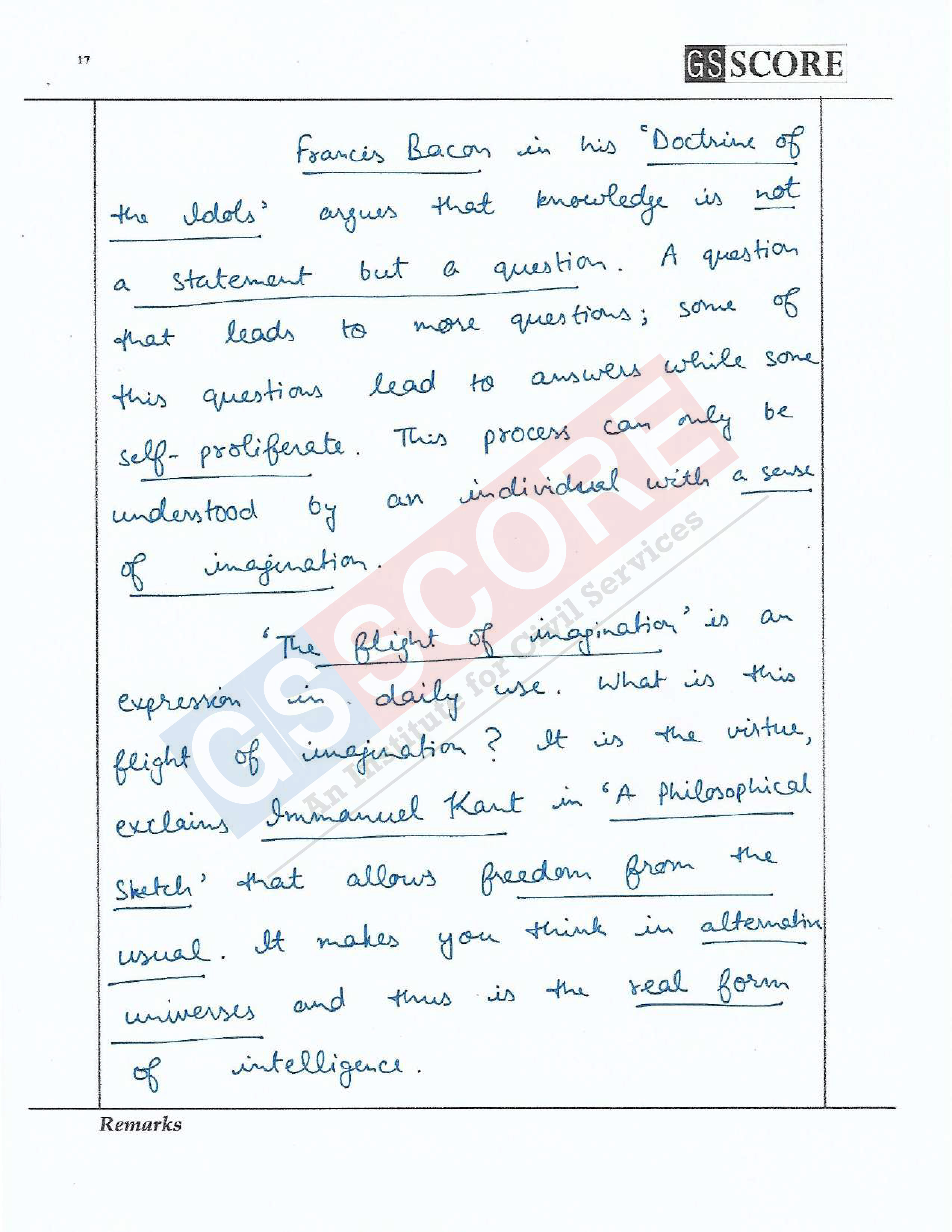
About the subject is nothing but knowledge that needs to be looked in different perspective, whether social, economical, political, religious, cultural, literary, national, and environmental. Candidate should think on different questions
- What are definition / scope / history of the topic?
- What can be said on particular subject from various perspectives?
- What are positives / negatives?
- Answers for different questions/dimensions
- your thought for critical appraisal
Arrangement :
Arrangement of an essay means the contents with a definite structure to be framed. The structure must be exposed indirectly through the flow of writing with interlinking of sub topics and paragraphs explaining the scope meaning, description and discussion.
Illustration and quotations known can be presented lively aptly to increase the richness of the content. It is like the flavor added to the dishes to attract the reader to be perfectly relevant to the topic/ argument. If the Quotations exceed unnecessarily, it will disturb the quality of presentation. Interlinking of thoughts, comparison and contrasting viewpoints can be expressed only with the special reference to the application of thoughts.
Opinions and arguments with strong self explanatory sentences will reflect the candidates’ solid and clear understanding of the subjects.
Now you need to give the powerful and logical conclusion which is the consequence of everything discussed earlier. Conclusion brings the reader closure or summing up of points and also gives final perspective. It should not be rhetoric outburst. It must be balanced and free from prejudice. Mind it, give proper space to the conclusion. Don’t sump in haste.
Do s and Don’ts for that ‘killer’ 3 Hrs:
- Read the title, understand the meaning and scope.
- Think and comprehensive planning before start.
- Effective, brief and strong words consist of good thoughts makes your essay best.
- Avoid vague generalization, slang’s and colloquialism
- Don’t try to present whatever you know on the subject.
- In controversial topic discuss pros and cons dispassionately and give effective conclusion.
- Length of essay is not fixed. But don’t be exhaustive. This time you may to write multiple essay
- Never forget to read and revise the essay written before submission to examiner.

Verifying, please be patient.
Our Centers
DELHI (Karol Bagh)
GS SCORE, 1B, Second Floor, Pusa Road, Karol Bagh, New Delhi - 110005 (Beside Karol Bagh Metro Station Gate No. 8)
Get directions on Google Maps
BHUBANESWAR (Jaydev Vihar)
GS SCORE, Plot No.2298, Jaydev Vihar Square, Near HCG Day Care, BBSR - 751013
LUCKNOW (Aliganj)
GS SCORE, 2nd Floor, B-33, Sangam Chauraha, Sector H, Aliganj, Lucknow, UP - 226024
Delhi (Karol Bagh) Centre
GS SCORE, Second Floor, Metro Tower, 1B, Pusa Road, Karol Bagh, New Delhi - 110005 (Beside Karol Bagh Metro Station Gate No. 8)
Email: [email protected]
Phone: +91 8448496262
Classroom / online / Live programs
- Mains Classes
- Mains Advance Classes
- Ethics & Essay Classes
- IAS Foundation
- Aadhar:NCERT Foundation
- Target PT:Prelims Classes
- Current Affairs Mentorship Program
TEST SERIES/ MENTORSHIP
- ITS:Integrated Test Series
- GS Mains Q&A (Mentorship & Test Series)
- GS TEST SERIES
- Ethics & Essay Test Series
- Samarth - Mains Answer Writing
STUDY MATERIAL
- PRELIMS STUDY MATERIAL
- MAINS STUDY MATERIAL
- MAINS ANSWER WRITING WORKBOOK
OTHER COURSES
- OPTIONAL FOUNDATION COURSES
- OPTIONAL Q&A (TEST SERIES)
- Mains Previous Year Questions
- © 2024 - IAS SCORE
All Rights Reserved.
Welcome to our secure login portal. Access your account with ease.

- Using Password
Not registered yet? register here!
Welcome to our secure register portal. For a brighter future, register now and unlock endless learning opportunities.
User Register
Already have an account? Login
Oops, forgot your password? Don't worry, we've got you covered. Reset it here
Lost your login details? No problem! forgot your password in just a few clicks
Forgot Password
Verify your mobile number, you have successfully logged in.
Join Us on WhatsApp
- Skip to primary navigation
- Skip to main content
- Skip to primary sidebar
UPSC Coaching, Study Materials, and Mock Exams
Enroll in ClearIAS UPSC Coaching Join Now Log In
Call us: +91-9605741000
Essay Paper UPSC 2022 (Mains): Question Paper and Analysis
Last updated on September 16, 2022 by ClearIAS Team

The Essay Paper in UPSC CSE 2022 was easy compared to previous years. Please find the questions in the Essay Paper of the UPSC 2022 Civil Services Mains Examination (written).
UPSC conducted the Essay Paper , as part of the Civil Services Main Exam 2022 on 16-09-2022. The question paper was not as shocking as last year.
There were 8 Essay topics, out of which candidates were asked to write on two topics in 3 hours.
Candidates were supposed to answer about 1000 words for each essay (about 10-12 pages).
Table of Contents
Essay Paper UPSC 2022 Instructions
- Total Marks: 250 marks, Time duration: 3 hours.
- The essay must be written in the medium authorized in the admission certificate which must be stated clearly on the cover of this question-cum-answer (QCA) booklet in the space provided.
- No marks will be given for answers written in a medium other than the authorized one.
- Word limit, as specified, should be adhered to.
- Any page or portion of the page left blank, must be struck off clearly.
Essay Question Paper – UPSC Civil Services Main Exam (Written) 2022
Write two essays, choosing one topic from each of the following Sections A and B, in about 1000-1200 words each:
- Forests are the best case studies for economic excellence.
- Poets are the unacknowledged legislators of the world.
- History is a series of victories won by the scientific man over the romantic man.
- A ship in the harbour is safe but that is not what a ship is for.
- The time to repair the roof is when the sun is shining.
- You cannot step twice in the same river.
- Smile is the chosen vehicle for all ambiguities.
- Just because you have a choice, it does not mean that any of them has to be right.
UPSC , as always, has ensured that the essay topics were much different from the GS questions.

A philosophical theme is clearly evident in most of the essay topics in Section A as well as Section B. This was the case in 2020 and 2021 as well. It is a clue about what UPSC expects from the essay paper.
Rather than asking candidates to write on topics most aspirants are familiar with or trained with, UPSC is now evaluating the essay writing skills of aspirants by providing them with abstract or philosophical topics.
This year, most of the topics were either proverbs or famous quotes.
All 8 topics presented this year will test the spontaneous thinking, comprehension, writing skills, and time management of aspirants.
Thinkers, Philosophers, and their Quotes
Let’s analyse the source of some of the question topics.
POETS ARE THE UNACKNOWLEDGED LEGISLATORS OF THE WORLD
This essay topic is one of the best-known and most frequently quoted lines from the Romantic poet Percy Bysshe Shelley (1792-1822).
Shelley thinks that poets can institute laws and create new materials for knowledge, determining the role of poets as legislators.

Shelley’s account of poetic language seeks to find an order to the chaos, which, possibly, Shelley sees in human society: the mess that only poets can fathom.
Therefore, he thinks, the poets’ enhanced poetic language can re-institute order in human society.
A SHIP IN HARBOUR IS SAFE BUT THAT IS NOT WHAT A SHIP IS FOR
This essay topic is connected with John A Shedd , an author and professor, who is attributed to this quote. Reference: his book Salt from My Attic , a collection of quotes and sayings (1928).
This phrase means, that getting out of your comfort zone is key to experiencing new things and broadening your horizons.
Only taking risks helps us grow as people—to either achieve our goals or do the things we’ve always wanted to do.
THE TIME TO REPAIR THE ROOF IS WHEN THE SUN IS SHINING
This essay topic was connected with John F. Kennedy. In his 1962 State of the Union Address, John F. Kennedy declared, “The best time to repair the roof is when the sun is shining”.
The primary message of the quote is fixing a leak is best done when the weather is good, rather than when it is not.
Ideally, you should begin the work of fixing the roof as soon after the leak was found. The first sunny day would be ideal. It is not easy to fix a roof when it is raining.
This statement is being used to remind us to do the right things at the right time. It also points us to take the advantage of favourable time.
YOU CAN NOT STEP TWICE IN THE SAME RIVER
This essay topic was quoted by Heraclitus, a Greek philosopher born in 544 b.c.
This means that you cannot step into the same river twice because the flow of the river will change each second. You will also change each second.
It is not possible to repeat past experiences, as time changes all things. You won’t get the exact experience twice. You need to live in the present and enjoy each moment.
A SMILE IS A CHOSEN VEHICLE FOR ALL AMBIGUITIES
This essay topic was quoted by Herman Melville, an American novelist.
JUST BECAUSE YOU HAVE A CHOICE DOES NOT MEAN THAT ANY OF THEM HAS TO BE RIGHT
This essay topic was quoted by Norton Juster, an American academic, architect, and writer in his book The Phantom Tollbooth
What should aspirants preparing for next year do for an essay paper?
First of all, you should take the essay paper seriously.
Unless properly trained, it is not easy to write 10-12 pages on an abstract or philosophical topic.
You need to polish your comprehension and analytical skills.
Read different kinds of essays – particularly philosophical essays.
Give stress to the thoughts of philosophers like Immanuel Kant, Thomas Aquinas, John Locke, Friedrich Niche, Karl Marx etc. Start writing essays on famous quotes.
Also, be prepared to write essays touching on other areas like society, politics, economy, or technology. UPSC is known for surprises.
Remember that there is nothing like a constant trend with respect to UPSC questions.
What you get by analysing the previous year’s question papers are clues. And only those are what you need from UPSC questions!

Aim IAS, IPS, or IFS?

About ClearIAS Team
ClearIAS is one of the most trusted learning platforms in India for UPSC preparation. Around 1 million aspirants learn from the ClearIAS every month.
Our courses and training methods are different from traditional coaching. We give special emphasis on smart work and personal mentorship. Many UPSC toppers thank ClearIAS for our role in their success.
Download the ClearIAS mobile apps now to supplement your self-study efforts with ClearIAS smart-study training.
Reader Interactions
September 17, 2022 at 5:03 am
I want to join this…..
Leave a Reply Cancel reply
Your email address will not be published. Required fields are marked *
Don’t lose out without playing the right game!
Follow the ClearIAS Prelims cum Mains (PCM) Integrated Approach.
Join ClearIAS PCM Course Now
UPSC Online Preparation
- Union Public Service Commission (UPSC)
- Indian Administrative Service (IAS)
- Indian Police Service (IPS)
- IAS Exam Eligibility
- UPSC Free Study Materials
- UPSC Exam Guidance
- UPSC Prelims Test Series
- UPSC Syllabus
- UPSC Online
- UPSC Prelims
- UPSC Interview
- UPSC Toppers
- UPSC Previous Year Qns
- UPSC Age Calculator
- UPSC Calendar 2024
- About ClearIAS
- ClearIAS Programs
- ClearIAS Fee Structure
- IAS Coaching
- UPSC Coaching
- UPSC Online Coaching
- ClearIAS Blog
- Important Updates
- Announcements
- Book Review
- ClearIAS App
- Work with us
- Advertise with us
- Privacy Policy
- Terms and Conditions
- Talk to Your Mentor
Featured on

and many more...
Take ClearIAS Mock Exams: Analyse Your Progress
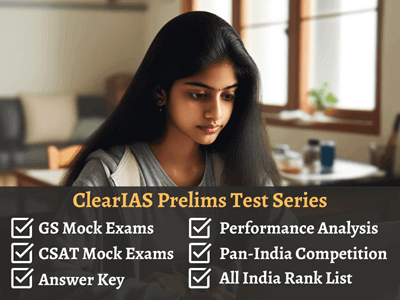
Analyse Your Performance and Track Your All-India Ranking
Ias/ips/ifs online coaching: target cse 2025.

Are you struggling to finish the UPSC CSE syllabus without proper guidance?

Writing a good Essay in UPSC Mains, Explained by Anudeep Durishetty
ForumIAS announcing GS Foundation Program for UPSC CSE 2025-26 from 27th May. Click Here for more information.
Novelist Stephen King put it beautifully when he said, “I write to find out what I think.”
Writing is a window to your thought process. What you write on paper will tell the reader how you think, how you argue and the way you substantiate your viewpoint. This is why for most competitive examinations and academic entrance tests, essay is mandatory.
In the Civil Services Exam too, we have a paper worth 250 marks, equivalent to a General Studies paper. Despite its importance, essay paper often does not get the attention it deserves from aspirants. First timers think they will write an excellent essay in the final exam itself, whereas experienced aspirants believe that since they had already studied a ton for GS, it will alone be enough to write a good essay. This is a fatal miscalculation.
I was one of those who made these errors in the past, and it is not a coincidence that I scored only 100 in CSE 2015. But in 2017, I devoted adequate time to this paper. I collected useful quotes, prepared notes and even made rough essay drafts for frequently asked topics. All this effort in essay paper helped me score 155.
What follows is an elaborate post on how you should tackle the Essay paper. I’ve organised the content as follows:
What UPSC says about the essay paper
How and from where to prepare?
Improving language and expression
- On subheadings and rough drafts
- What you must avoid
- How to write a powerful introduction?
- Developing the content of an Essay
Substantiating your arguments
- How to conclude an Essay
- My notes, quote collection and sample essays
“Candidates may be required to write essays on multiple topics. They will be expected to keep closely to the subject of the essay, to arrange their ideas in an orderly fashion, and to write concisely . Credit will be given for effective and exact expression .”
Essay distinguishes itself from GS in the sense that in GS, marks will be awarded purely for content. But in essay, examiners will pay special attention to not just the content, but also the language, coherence and the way you organise your write-up.
So you must take adequate care to arrange your ideas properly and not commit any fundamental spelling or grammatical errors.
Most of the content you write in Essay will come from your GS preparation. Apart from this, the following sources will help:
- Reading non-fiction helps you develop a matured thought process. Apart from imparting knowledge, they will also let you come across good figures of speech, art of argumentation, powerful rhetoric and unique content etc. For example, in an essay on Artificial Intelligence, I took arguments from Yuval Harari’s Homo Deus to argue that AI is an imminent threat to humanity. Or if you read Why Nations Fail, a book replete with examples, you will understand the importance of innovation, political and economic freedoms in propelling a nation forward. So my suggestion is, apart from UPSC related material, develop the hobby of reading non-fiction books. I do not mean to suggest that you should start reading one non-fiction book per topic to get good scores in Essay, but reading them occasionally in your free time will benefit you in the long run.
- Referring to specific magazines: For certain topics, you can refer to specific issues of Yojana/EPW/Economic Survey etc. Example: for an essay on tribal issues or public health, you can go through specific issues of these magazines for getting the latest statistics (IMR, MMR, malnutrition levels etc) and also about the positives and criticisms of govt schemes in that sector.
- Collecting good stories/anecdotes and quotes: Anecdotes, quotes and real life stories you see in newspapers and books which can be used in essay should be noted down. In most of my essays, I used to start with a relevant story or an anecdote that has the essay topic as its underlying theme. Apart from these, I also used a couple of quotes of eminent persons.
List of quotes, anecdotes I collected are available in the link at the end of this article.
Language in essay must be simple and clear with as little jargon as possible. If you want to use complex definitional terms such as, say, ‘Constitutionalism’ or ‘Sanskritisation’ please define it in sentence just before you use it. Examiner will also understand clearly what you want to convey. Clear writing is clear thinking. And that is what any reader looks for.
Keep your sentences short and powerful. Long, winding sentences makes it difficult to read and understand. If you tack on one clause after another through conjunctions, what you get is a bad sentence sprawl.
Example of a bad sentence sprawl:
At the end of World War 2, on the one hand, while capitalism was successfully championed by the nations in North America and Europe, on the other hand, it was USSR that put Communism at the forefront due to which there was an ideological clash between the the two superpowers which had led to proxy wars in various parts of the globe, a nuclear arms race and a rapid deterioration of the security of the world.
(By the time readers finish reading it, they will lose their breath and the point of the sentence)
So I had a simple rule: If you run out of your breath while reading a sentence, then probably you will have to break it into two.
Rewriting the aforementioned example after breaking it into two (which makes it much easier to read and comprehend):
After World War 2, while the North American and European nations championed capitalism, USSR put communism at the forefront. This ideological clash between the superpowers led to several proxy wars, a nuclear arms race and a rapid deterioration of world security.
There is no need to memorise complex words for writing a good essay. But an occasional use of a powerful word, or a good phrase definitely gives your write-up an edge.
Also, I believe that learning numerous words by rote will not make them stick in your brain for long. The best way to build your vocabulary is by reading non-fiction and English newspapers. While reading these, if you come across a good turn of phrase, or a word that you don’t recognise, please note it down in a book, find its meaning and understand the context in which the word was used. This helps in long term memory. Having a dictionary app on your phone also helps.
Building vocabulary is a slow process, but with consistency, anyone can become better at using an expansive set of words.
Subheadings & Rough Drafts
We can be a little innovative in our subheadings. Instead of bland subheadings such as ‘ Benefits of Nuclear Energy’ we can use “ Nuclear Energy: Promise or Peril?’ Similarly, for the essay on Social Media, instead of writing ‘ Advantages and Disadvantages of Social Media ’, I wrote “Social Media: A Double Edged Sword”
You can find my collection of a few such subheadings in the link to my notes, given at the end of the article.
I also prepared a rough draft for a few essay topics (link given at the end). You may need to modify the structure as per the demand of the question.
What you must avoid in Essay
- Do not focus excessively only on one point, or one dimension (such as the historical or political aspect) Your essay needs to be expansive and multi-dimensional.
- During preparation, we read a lot and it’s understandable that we feel strongly about certain topics. And since essay offers freedom to write, it’s very easy to get carried away with such a topic. But make sure that you write what is asked, not what you know or feel like. No mann ki baat . Always stick to the subject of the topic. It helps to read the question in the midst of your essay to ensure that you are not steering away from the topic.
- If you are not comfortable writing about abstract philosophical topics (I am terrible at writing them), avoid such questions. Your choice of topic has no bearing on the marks and that is why, selecting an unpopular topic just for the sake of it is unwise. Also, if there’s a technical term in the question, be doubly sure that you understand it correctly. For instance, in 2014, there was a question on ‘standard tests’, which is a technical term. I misunderstood it and wrote a generic essay. I got 112.
- When you take a final stand on an issue, it’s best to avoid extreme or highly unpopular opinions. We are free to have any opinion in the privacy of our minds, but in UPSC essay why take that risk? For instance, in an essay on Capital Punishment, in the main body content, you should present a case for both abolition and retention. But when you take a stance, it’s best to be an abolitionist.
- No ranting. You might be a great fan of Karl Marx, but if there’s a question on Capitalism, do not rant or rail against it ? You must present both the positives and negatives of Capitalism and end the essay on a balanced note.
- Do not dedicate disproportionate amount of time for the first essay and scamper through the second. Both carry equal marks, so please invest equal time.
How to transition smoothly from one para to the next
This can be done in three ways.
Through a link sentence at the end of a para:
Here, at the end of a para, you write a sentence that signals to the examiner what’s coming next. For example, let’s say you have just written a para about the threat posed by Artificial Intelligence (AI) to jobs. At the end of that para you can write a link sentence— “Further, we must be mindful of the fact that Artificial Intelligence poses a major challenge not just economically, but also ethically.” And in the next para, you can write about the ethical issues concerning AI.
Through a question:
Instead of a link sentence, you can also add a question at the end of a para so that examiner’s attention is helplessly carried to the next. To take the similar example as above, the question can be something like— “Thus we have examined the threat posed by AI to our economy, but what about the challenges brought by AI to our ethics and morals?” And in the next para, you can write about the ethical issues concerning AI.
Signalling the shift at the start of next paragraph:
Here you can simply add a word or two at the beginning of a para that signals a shift in your subtopic. For example in an essay on Globalisation , let’s say you have just written a para about its historical evolution and impact. You can start the next para with something like— “Politically too, globalisation has had a tremendous impact……” This way examiner immediately knows what to expect.
These steps will ensure that the transition between paragraphs is not abrupt.
How to write a good Introduction to your Essay?
Essay introduction can be:
a fictitious incident or story (where you introduce a character); a real life anecdote; a quote; or a simple definition of the words in the question (not recommended in Essay)
In GS, definitional approach is a great way to introduce your answers. But in essay, they are rather stale, lacking in any human element. I always believe that a good way to start your essay is to have that touch of humanity and warmth in your introduction.
In my Mains exam, this was my introduction to the essay ‘Destiny of a nation is shaped in its classroom’
“The year was 1945. Towards the end of a gruesome world war, the world powers decided to carve up the Korean peninsula along the 38th parallel.
“Before partition, North and South Korea might have been homogeneous in every respect, but after the division, they steered onto different paths. While schools in the North chose to ‘educate’ their children in the worship of a cult leader, ideological indoctrination and servility, its southern counterpart focused on liberal education, innovation and economic growth.
“Today, almost seven decades later, the difference in the fates of these people and the trajectories of both these nations cannot be more stark. One is known for gross violation of human rights, while the other a champion of liberal democracy. One is known for gut-wrenching poverty, while the other unbridled prosperity.
“This only proves the age old adage that the destiny of a nation is indeed shaped in its classrooms.”
Similarly, for the Social Media essay, my introduction sought to bring to the fore the paradox of Social Media. I wrote on how social media was leveraged to crowdsource help and rescue during Chennai floods in 2015. At the same time, I mentioned how it was used nefariously in 2012 to cause mass exodus of northeast people from Bangalore. And taking cue from this introduction, in the main body, I discussed about the inherent selfishness and altruism associated with social media.
These real life stories, anecdotes and incidents are everywhere in our books and newspapers. So when you come across them, note down and ponder as to how you can use them in your essay.
Developing the Main Content from the Topic
This is like spinning the web from a thread. Depending on the topic, you can choose among the following options that fits best.
- Temporal: Past, present and future
- Sectoral: Media, Science & Tech, Business, Sports, Religion, Politics, Administration etc
- Walks of Life : Individual, Family, Professional workplace, Society, Community, National, Global
- Problem & Solution: Concept (historical evolution+status), benefits, problems, solutions
- Standard : Social, Political, Economical, Administrative, International, Environmental, Historical, Scientific, Security/Defence, Legal
Example: for a topic like “Has Globalisation delivered on its promise?” I find the problem & solution method an apt way to develop your narrative. So choose as per the question.
In the main body of the essay, each para must have an argument or an idea and a reasoning to back that argument. You can substantiate it through a real life example, a statistic, an authentic committee or organisational report etc.
For example, if you are arguing that Capital punishment is an expensive form of justice, you should be able to given an example or a statistic or Law Commission’s opinion as to how the subjects of death penalty are overwhelmingly from poor communities.
Statistics, examples, expert opinions and constitutional provisions are crucial and they make your arguments authoritative.
Concluding an Essay
Conclusion needs to be on a futuristic, optimistic note. You need to summarise the complete essay in 3-4 sentences, after which you can write your vision for future.
You can source some useful terms from the speeches of PM Modi. Phrases like Sabka saath sabka vikas , Reform-Perform-Transform, Building A New India etc can come handy. Rhetoric, lofty expressions, constitutional ideals, sanskrit slokas and quotes are a good way to conclude your essay.
But suppose in your introduction, if you had written about a fictitious character, then it’s always advisable to end your write-up with a reference to that character. It gives a sense of completeness to the essay.
Readers should keep in mind that these notes are written rather haphazardly (I mean who makes notes thinking that in future, they might have to upload them publicly :D)
They are fragmented in certain pages, so you may not be able to comprehend them completely, but nevertheless I hope you take home something useful.
Link to handwritten notes:
https://drive.google.com/open?id=1jmVMGOzAk2d9B5Y0HQ9XpVF5Mh2IXGku
Quote collection:
https://drive.google.com/open?id=1jk71jLao60hHwJoTuGYaIDgJWccxa5Xn
List of Topics one needs to prepare:
https://drive.google.com/open?id=1q0W0PeH-80EKt6ucJTFOVPUlmXvCIzd-
Sample Essays:
https://drive.google.com/open?id=1jqfUi1FXdG0icBdJpdQvwH1wlAizCMvo
Read More at: https://anudeepdurishetty.in/

Type your email…
Search Articles
Latest articles.
- Neglect of Children’s Issues in Elections
- Importance of Healthcare Cost Management
- UPSC Prelims Marathon 4th June – Political & Cultural Developments in 200BCE to 300 BCE – 2024
- 10 PM UPSC Current Affairs Quiz 3 June, 2024
- 9 PM UPSC Current Affairs Articles 3rd June, 2024
- Impact of industrial revolution on India’s economy
- China’s proposal for a treaty on the no-first-use of nuclear weapons
- Visions for India’s future
- Challenges in India’s current energy policy
- Inequality and Its Impact
Prelims 2024 Current Affairs
- Art and Culture
- Indian Economy
- Science and Technology
- Environment & Ecology
- International Relations
- Polity & Nation
- Important Bills and Acts
- International Organizations
- Index, Reports and Summits
- Government Schemes and Programs
- Miscellaneous
- Species in news
All India Open Test(Simulator X)
General Studies
All Programmes
Study Material
UPSC Essay Topics - Important Essay Topics for UPSC Mains 2023
By vajiram & ravi.
Essay Course for UPSC
UPSC CSE Mains 2023 Essay Question Paper
UPSC Mains Optional Test Series
Mentorship Program for UPSC 2024
Understanding UPSC Essay Topics holds significant importance as it evaluates the candidate's ability to analyse, present arguments, and communicate effectively. In this article, we will explore the diverse range of UPSC essay topics, their significance, and essential tips to excel in this section. Get ready to enhance your writing and analytical skills and make a strong impression on the evaluators with well-crafted essays.
UPSC Essay Paper
The Essay paper in the UPSC Mains examination requires candidates to write multiple essays , each on a different topic, chosen from a given list of options. The essay topics for UPSC cover a wide range of issues, including social, economic, political, cultural, and philosophical aspects, both national and international.
The essay paper holds significant weightage in the UPSC Mains examination, contributing 250 marks out of the total 1750 marks . Scoring well in this section can have a considerable impact on the overall ranking and selection for the coveted civil services.
Weekly UPSC Essay Topics By Vajiram & Ravi
The UPSC Essay Paper is an opportunity for candidates to demonstrate their proficiency in expressing ideas and analysing complex issues. Vajiram & Ravi Pensive-Weekly Essay Writing Programme provides you with two Essay Topics every Saturday based on the previous year's question papers and the changing trends analysis. You can submit your Essay for peer evaluation on vajiramandravi.com. This will help you nourish your writing skills, give you clarity of thought, and build the capacity to express opinions in a logical and coherent manner.
Important Essay Topics for UPSC 2023
The purpose of the essay paper is to assess the candidate's ability to critically analyse a topic, present well-structured arguments, and communicate their ideas effectively. It also evaluates their knowledge of various issues, their clarity of thought, and their capacity to express opinions in a logical and coherent manner.
Some of the Important Essay Topics to prepare for the UPSC Mains Examination 2023 are:
- Gender Equality
- Environment/Urbanization
- Economic Growth
- Federalism/Decentralization
- Agriculture
- Economics
UPSC Essay Topics on Philosophy
Every year, UPSC typically provides you with two or more essay topics centred around philosophical thoughts, Indian philosophical schools, or quotes from notable personalities. To effectively address these philosophical topics, you should refer to Philosophy Books to gain a foundational understanding. Here is a list of UPSC Essay Topics on Philosophy :
- Everything comes to him, who hustles while he waits.
- We are always blind as we want to be.
- You cannot step twice in the same river.
- A disciplined mind brings happiness.
- The price of Greatness is Responsibility.
- People would rather Believe than Know.
- Mind - A beautiful Servant? Or a dangerous Master?
UPSC Essay Topics on Art and Culture
The UPSC Essay Topics related to Indian society, art, and culture cover a wide range of subjects, offering great diversity. To gain knowledge about the static content on these topics, you should rely on fundamental books on society, as recommended for the exam. Here is a list of UPSC Essay Topics on Indian Art and Culture :
- Culture changes with economic development.
- Culture is what we are, Civilization is what we have.
- Social reform is a myth if places of worship are open only to all castes and not to all genders.
- Impact of Globalization on Indian Art and Culture.
- Caste System - India’s Enduring Curse.
- Godmen - A Threat to Indian Art and Culture?
UPSC Essay Topics on Science and Technology
UPSC essay topics on Science and Technology can largely be addressed through current affairs. You may also benefit from consulting a Science and Technology Book for UPSC to compose a comprehensive and well-rounded essay. Here are some UPSC Essay Topics on Science and Technology:
- Deglobalisation is good for the world.
- Science is organised Knowledge. Wisdom is Organised life.
- Technology is a Weapon against Poverty.
- Prioritising Education Technology for Global Growth.
- Technology is the silent factor in International Relations.
- Scientific and Technological Progress cannot be equated with Human Progress.
UPSC Essay Topics on Education
Education stands as one of the preferred UPSC Essay Topics, with an essay related to this subject often appearing in the paper each year. To tackle this topic effectively, you should stay abreast of Current Affairs , incorporating significant changes and advancements in the field. Let's explore some of the Essay topics for UPSC centred around education:
- Self Education is a lifelong curiosity.
- Education Breeds Peace.
- Education is a progressive discovery of our own ignorance.
- Education must also train one for quick, resolute and effective thinking.
- Schooling is not Education.
UPSC Essay Topics on Polity and Governance
To comprehensively address Polity and Governance topics, you should acquire fundamental knowledge from Polity Books for UPSC and Current Affairs. These resources offer static information about relevant issues and their historical context, which proves valuable while writing UPSC Essay Topics on Polity. Here are some Essay Topics on Polity and Governance:
- The Role of Politics in Development.
- Should Youth in India Consider Politics as a Career?
- Art, Freedom and Creativity will change society faster than politics.
- The politics of Identity is the Politics of the Weak.
- People should not be afraid of their Government. The Government should be afraid of its people.
- Government Surveillance - Good or Bad?

UPSC Essay Topics on Economy
Essays concerning economic growth are frequently included in the Essay Paper. To tackle these topics effectively, you should refer to Economy Notes for UPSC to gain a comprehensive understanding. Once the fundamentals are grasped, you can enhance their essays by incorporating examples, data, and statistics to create a multidimensional perspective. Here is a list of UPSC Essay Topics on Economy:
- We don't have to sacrifice a Strong Economy for a Healthy Environment.
- India, a $5 trillion Economy - Dream or Reality?
- Digital Economy: A leveller or a source of Economic Inequality?
- Innovation is the key determinant of social welfare and economic growth.
- Labour Reforms in India and its Role in Economic Growth.
UPSC Essay Topics on Social Issues
Social issues are a significant aspect of the UPSC essay paper, reflecting the candidates' understanding of societal challenges and their ability to propose viable solutions. These essays provide a platform for candidates to analyse, critique, and suggest measures for pressing social concerns. Topics related to social issues in the UPSC Essay paper may include:
- Inclusivity and Plurality are the hallmarks of a Peaceful Society.
- A Gender-sensitive Indian Society is a prerequisite for Women and Child Empowerment.
- The weaker sections of Indian Society - are their Rights and Access to Justice getting Better?
Previous Year UPSC Essay Topics
Practising previous year's essay topics will help you become familiar with the UPSC exam pattern , word limit, and the types of essay questions frequently asked in the Mains Examination. Analysing past essay topics will also allow you to identify recurring themes and trends, enabling you to prioritise their preparation accordingly. Regular practice with past essay topics will instil confidence in you, helping you feel more comfortable and prepared for the actual exam.
- Forests are the best case studies for economic excellence.
- Poets are the unacknowledged legislators of the world.
- History is a series of victories won by the scientific man over the romantic man.
- A ship in the harbour is safe, but that is not what a ship is for.
- The time to repair the roof is when the sun is shining.
- A smile is the chosen vehicle for all ambiguities.
- Just because you have a choice, it does not mean that any of them has to be right.
Tips to Excel in UPSC Essay Paper
- Understand the Topics: Thoroughly comprehend the essay topics, including the keywords and instructions. Choose a topic that aligns with your strengths and interests.
- Plan and Structure: Devote some time to plan your essay. Create an outline and organise your thoughts in a structured manner, with a clear introduction, body, and conclusion.
- Be Objective: Present balanced arguments and avoid a biased or one-sided approach. Consider multiple perspectives and present a holistic view.
- Provide Examples and Evidence: Support your arguments with relevant examples, data, quotes and evidence to strengthen your essay.
- Maintain Clarity: Write in a clear and concise manner. Use simple language and avoid jargon or overly complex vocabulary.
- Practice Regularly: Regular practice is essential to improve Essay writing skills. Write essays on diverse topics to enhance your versatility.
- Time Management: Allocate appropriate time for planning, writing, and revising each essay to manage time effectively during the examination.
- Revise and Edit: Review your essays for coherence, grammar, and structure. Make necessary edits to refine your work.
FAQs on UPSC Essay Topics
What are the important UPSC Essay Topics?
Here is a list of UPSC Essay Topics asked in Mains Examination previously:
- Culture is what we are, civilization is what we have.
- Simplicity is the ultimate sophistication.
- What is research but a blind date with knowledge?
- Best for an individual is not necessarily best for society.
- Wisdom finds truth.
- Ships don’t sink because of water around them, ships sink because of water that gets into them.
- Patriarchy is the least noticed yet the most significant structure of social inequality.
- Technology as the silent factor in international relations.
How do I Prepare for the UPSC Essay?
To prepare for the UPSC essay, focus on understanding the essay syllabus and past topics to identify recurring themes. Regularly practise writing essays on various topics to improve your writing skills and time management. Structure your essays with a clear introduction, main body, and conclusion.
Which is the best source to practise UPSC Essay Topics?
The best sources to prepare Essay for UPSC include official UPSC materials, newspapers, and magazines like The Hindu, Yojana , and Kurukshetra for current affairs, standard books on diverse subjects, government reports and publications, online platforms like PIB and PRS India, UPSC previous year papers for understanding the exam pattern, and regular practice of essay writing on various topics.
© 2024 Vajiram & Ravi. All rights reserved

UPSC Mains: Syllabus, Question Papers, Mock Tests, Art of Answer Writing
- Mains GS Papers Topicwise from 2013-2023
- Mrunal’s Model Answers for UPSC GSM-2020 Paper
Mains GS Paper1: History, Social Science, Geography
Mains gs paper2: polity, governance,international relation, mains gs paper3: economy, environment, sci-tech, internal security, mains gs paper4: ethics, integrity, attitude, mains gs and essay papers topicwise from 2013-2022.
- [Download] UPSC Mains Essay Paper, Including Topicwise last 30 YEARS Essay Question Papers (1993-2023) with booklist, strategy!
- [Download] Topicwise UPSC Mains General Studies Paper-1 (GSM1): History, Geography, Social Science
- [Download] Topicwise UPSC Mains General Studies Paper-2 (GSM2): Polity, Welfare, Governance, International Relations (IR) since new Syllabus of 2013-2023
- [Download] Topicwise UPSC Mains General Studies Paper-3 (GSM3): Economy, Agriculture, Disaster Management, EIA, Science, Internal Security since new Syllabus of (2013-2023)
- [Download] UPSC Mains General Studies Paper-4 (GSM4) Topicwise Ethics, Integrity & Aptitude – All Papers (2013-2023)
- Indian culture covers the salient features of Literature, Art Forms, and Architecture from ancient to modern times.
- Modern Indian history include the significant events, personalities, issues during the middle of the eighteenth century until the present
- Various stages and important contributors and contributions from different parts of the country in ‘The Freedom Struggle’
- Post-independence consolidation and reorganization within the country
- History of the world includes events, forms and effect on the society from 18th century like world wars, industrial revolution, colonization, redrawal of national boundaries, decolonization, political philosophies like communism, capitalism, socialism etc
- Salient aspects of Diversity of India and Indian Society
- Role of women and women’s organization, population and associated issues, poverty and developmental issues, urbanization, their problems and remedies
- Social empowerment, communalism, regionalism & secularism
- Distribution of key natural resources across the world including South Asia and the Indian sub-continent; factors responsible for the location of primary, secondary, and tertiary sector industries in various parts of the world including India
- Effects of globalization on Indian society
- Salient features of world’s physical geography
- Important Geophysical phenomena such as earthquakes, Tsunami, Volcanic activity, cyclone etc., geographical features and their location- changes in critical geographical features (including water-bodies and ice-caps) and in flora and fauna and the effects of such changes
- [Download] ALL UPSC GSM1 Question Papers (Topicwise) from 2013-22 with Analysis & Future Strategy
- [Model Answer] UPSC GSM1: Urban poor women living conditions more deplorable than rural counterparts
- [Lecture] UPSC Mains Answer Writing with Self-Assessment-Benchmarks: Democractic Elements in Religious Reforms (250 Words)
- [Lecture] UPSC Mains Answer Writing with Self-Assessment-Benchmarks: Quit India Movement- Planned or Spontaneous? (250 Words)
- [Lecture] UPSC Mains Answer Writing with Self-Assessment-Benchmarks: Gandhi’s Secular Image vs. Khilafat Support
- [Lecture] UPSC Mains Answer Writing with Self-Assessment-Benchmarks: British Imperialism Exigencies
- [Lecture] UPSC Mains Answer Writing with Self-Assessment-Benchmarks: Hindu elements in Mughal Architecture
- [Lecture] UPSC Mains Answer Writing with Self-Assessment-Benchmarks: Chola Bronze Sculptures
- [Model Answer] UPSC GSM1-2017/Q20: Geography / Urbanization- New Problems of IT-BPO Cities (250 words, 15 marks)
- [Model Answer] UPSC GSM1-2017/Q19: How religiosity transformed into communalism in Independent India? (250 words)
- [Full Length Mock] UPSC Mains General Studies Paper-1 with FREE Question-cum-Answerbooklet (QCA)
- [Model Answer] UPSC GSM1-2017/Q18: Women Issues & Debates in the 19th Century India (250 words, 15 marks)
- [Model Answer] UPSC GSM1-2017/Q17: Geography- Monsoon climate that feeds over 50% population of World
- [Model Answer] UPSC GSM1-2017/Q16: Geography- Converting floods into irrigation & inland navigation sources?
- [Model Answer] UPSC GSM1-2017/Q15: Implications of Market-based Petro Refineries on developing country?
- [Model Answer] UPSC GSM1-2017/Q14: Oceanic Salinity variations & its multi-dimensional effects (250 words, 15 marks) Physical Geography
- [Model Answer] UPSC GSM1-2017/Q13: New Objectives added to vision of Free India since 1920s
- [Model Answer] UPSC GSM1-2017/Q12: How traditional artisanal industry’s decline crippled rural economy of colonial India
- [Model Answer] UPSC GSM1-2017/Q11: Indian society’s spirit of tolerance & love in past & present times
- [Model Answer] UPSC GSM1-2017/Q10: Major legal initiatives by the State since Independence on discrimination against Scheduled Tribes (STs)
- [Model Answer] UPSC GSM1-2017/Q9: Whether regions form cultural units or States? (10 Marks)
- [Model Answer] UPSC GSM1-2017/Q8: Geography: How does Cryosphere affect Global Climate?
- [Model Answer] UPSC GSM1-2017/Q7: Benefits of Pulse Cultivation, Why UN declared International Year of Pulses?
- [Model Answer] GSM1-2017/Q5: Physical Geography: NASA’s Juno Mission: Knowing Earth’s Origin from Jupiter’s Data?
- [Model Answer] GSM1-2017/Q4: World History- Decolonization problems in Malay Peninsula
- [Model Answer] GSM1-2017/Q3: Freedom Struggle: Why Moderates failed to convince masses by end of 19th Century?
- [Model Answer] GSM1-2017/Q2: Spectre of fragmented polity in mid-eighteenth century India (150 words, 10 Marks)
- [Model Answer] GSM1-2017/Q1: Gupta coins & numismatic art was better than its successive dynasties. Justify (150 Words, 10 Marks)
- [Model Answer] UPSC GSM1-2017/Q6: Carbon Imperialism vs Economic Cost of Renewable Energy vs Social Cost of Thermal Powerplants: Model Answers in Hindi & English
- [Full Length Mock] UPSC Mains GS1, Set#1: History & Culture, Society & Geography; with sources for Model Answerkey
- [AW/GSM1] Art & Culture: Declining Male Classical Dancers & Sanskrit Literature in Modern India- with Model Answers
- [AW/GSM1] History: Thugs of Hindustan, Criminal Tribes Act 1871, Rise of Totalitarianism in Europe- with Model Answers
- [AW/GSM1] Society: Post-Truth & Rise of Intolerance in India vs (GSM2): Constitution: Liberty of Thought & Expression? With Model Answers
- [AW/GSM1] Post-Independence: LTTE vs IPKF & Globalization vs FLPR with Model Answers
- Lecture/Rao forGSM1: Narasimha Rao’s Diplomacy & Mains Answer writing Basics
- Lecture/GSM1: Right wing Vigilantism in India vs Alt-Right in Trump’s USA: Compare Contrast
- Lecture/GSM1&4: DeenDayal- Integral humanism (एकात्म मानवदर्शन), One India (एक भारत), Dharma Rajya
- Lecture/GSM1: Leather Industry- Location Factors, Opportunities, Challenges, Cow Vigilantism
- Lecture/GSM1- Urban Floods: Problem, Remedies, Chennai Floods & Disaster Mitigation
- FREE Complete Lecture Series on World History by Pratik Nayak
- Indian Constitution- historical underpinnings, evolution, features, amendments, significant provisions and basic structure
- Functions and responsibilities of the Union and the States, issues and challenges pertaining to the federal structure, devolution of powers and finances up to local levels and challenges therein
- Comparison of the Indian constitutional scheme with that of other countries
- Separation of powers between various organs dispute redressal mechanisms and institutions
- Parliament and State Legislatures – structure, functioning, conduct of business, powers & privileges and issues arising out of these
- Appointment to various Constitutional posts, powers, functions and responsibilities of various Constitutional Bodies
- Structure, organization and functioning of the Executive and the Judiciary Ministries and Departments of the Government; pressure groups and formal/informal associations and their role in the Polity
- Salient features of the Representation of People’s Act
- Government policies and interventions for development in various sectors and issues arising out of their design and implementation
- Statutory, regulatory and various quasi-judicial bodies
- Welfare schemes for vulnerable sections of the population by the Centre and States and the performance of these schemes; mechanisms, laws, institutions and Bodies constituted for the protection and betterment of these vulnerable sections
- Health, Education, Human Resources
- Development processes and the development industry the role of NGOs, SHGs, various groups and associations, donors, charities, institutional and other stakeholders
- Issues relating to development and management of Social Sector/Services relating to
- Important aspects of governance, transparency and accountability, e-governance- applications, models, successes, limitations, and potential; citizens charters, transparency & accountability and institutional and other measures
- Issues relating to poverty and hunger
- Role of civil services in a democracy
- Bilateral, regional and global groupings and agreements involving India and/or affecting India’s interests
- India and its neighborhood- relations
- Important International institutions, agencies and fora, their structure, mandate
- Effect of policies and politics of developed and developing countries on India’s interests, Indian diaspora
- [Download] ALL UPSC GSM2 Question Papers (Topicwise) from 2013-22 with Analysis & Future Strategy
- [Model Answer] UPSC GSM2: Critically Examine the Need to abolish No-Detention Policy under Right to Education Act (150 words)
- [Model Answer] UPSC GSM2: Explain the signifiance of ‘Affordable Housing’ in Human & Economic Development of India (150 words)
- [Model Answer] UPSC GSM2: Why did Govt. propose Triple Talaq Bill / Ordinance? List Salient Features (150 words)
- [Model Answer] UPSC GSM2: Diplomacy- Modi’s De-hyphenation Policy vs Nehru’s NAM Policy (250 words, 15 Marks)
- [Model Answer] UPSC GSM2: Son Meta-Preference impact on India’s Gender Inequality Index (GII) at UNDP (250 words)
- [Model Answer] UPSC GSM2: Ayushman Bharat-NHPM: Features, Fiscal & Administrative challenges (250 words, 15 marks)
- [Model Answer] UPSC GSM2: 15th Finance Commission’s Terms of Reference (TOR)- Why are States apprehensive? (250 words)
- [Model Answer] UPSC GSM2: Law Commission Report#276: Legalizing Sports-Betting in India. Discuss your Stand (250 words)
- [Model Answer] UPSC GSM2: National Register of Citizens (NRC) & Assam Accord: Features & Interconnections (250 words)
- [Model Answer] UPSC GSM2: Article 239AA & Lieutenant Governor’s Absolutism Post-SC Judgement
- [Model Answer] UPSC GSM2: OBC Sub-categorization: Constitutional and Legal dimensions (150 words, 10 marks)
- [Model Answer] UPSC GSM2: American Senate is more powerful than Indian Rajya Sabha. Analyse
- [Full Length Mock] UPSC Mains GS2: Set#2- US Senate vs Rajya Sabha, Modi’s De-hyphenated Policy vs Nehru’s NAM
- [Full Length Mock] UPSC Mains GS2: Set#1 with model Answerkey: SC guidelines on Section 498-A
- [Economy/GSM2] Trade in Services Agreement (TiSA) vs WTO: MFN-Forward, Standstill & Ratchet, India’s stand, with Model Answers in Hindi & English
- [AW/GSM2] Art of Answer writing: Uniform Civil Code (UCC)- 3 Mock Questions & Model Answers in Hindi & English
- [AW/GSM2] Art of Answer writing: Regulatory Bodies autonomy & independence: Model Answers in English & Hindi
- Lecture/GS2: Natural Fiber Textiles vs SDG; Bulk Drugs & API Industry- Govt Policies
- Lecture/GSM2: Polity- Referendum in India? Lessons from BREXIT, Columbia & Scotland
- Lecture/GSM2: Polity- Refugee & Asylum Framework in India? Lessons from EU-Refugee Crisis
- Lecture/GSM2: Polity- Parliamentary Secretary, Office of Profit: Constitutional origins?
- Lecture/GSM2: Polity- Directly Elected Mayor system in ULBs, Private Member’s Bill- merits of
- Lecture/GSM2: Polity- Regulatory Bodies: Algo-Trading vs SEBI, MCI vs NMC?
- Indian Economy and issues relating to planning, mobilization of resources, growth, development and employment.
- Development, Bio diversity, Environment, Security and Disaster Management.
- Government Budgeting.
- Inclusive growth and issues arising from it.
- Major crops cropping patterns in various parts of the country, different types of irrigation and irrigation systems storage, transport and marketing of agricultural produce and issues and related constraints; e-technology in the aid of farmers
- Economics of animal-rearing.
- Food processing and related industries in India- scope and significance, location, upstream and downstream requirements, supply chain management.
- Issues related to direct and indirect farm subsidies and minimum support prices; Public Distribution System objectives, functioning, limitations, revamping; issues of buffer stocks and food security; Technology missions
- Land reforms in India.
- Effects of liberalization on the economy, changes in industrial policy and their effects on industrial growth.
- Infrastructure: Energy, Ports, Roads, Airports, Railways etc.
- Investment models.
- Science and Technology- developments and their applications and effects in everyday life Achievements of Indians in science & technology;
- Indigenization of technology and developing new technology.
- Conservation, environmental pollution and degradation, environmental impact assessment
- Awareness in the fields of IT, Space, Computers, robotics, nano-technology, bio-technology and issues relating to intellectual property rights.
- Disaster and disaster management.
- Role of external state and non-state actors in creating challenges to internal security.
- Linkages between development and spread of extremism.
- Challenges to internal security through communication networks, role of media and social networking sites in internal security challenges, basics of cyber security; money-laundering and its prevention
- Various Security forces and agencies and their mandate
- Security challenges and their management in border areas; linkages of organized crime with terrorism
- [Download] ALL UPSC GSM3 Question Papers (Topicwise) from 2013-22 with Analysis & Future Strategy
- Model Answers for UPSC Mains → GSM3-2019/Q12: Disaster Vulnerability types & characterization in हिंदी & English (10m, 150 words)
- Model Answers for UPSC Mains → GSM3-2019/Q11: Hazard Zonation Mapping for Landslide Disaster Preparedness in हिंदी & English (15m, 250 words)
- Model Answers for UPSC Mains → GSM3-2019/Q10: Govt Reforms to make PDS food grain distribution system more effective (15m, 250 words) in हिंदी & English
- Model Answers for UPSC Mains → GSM3-2019/Q9: Govt initiatives for Food Processing Sector in India (15m, 250 words) in हिंदी & English
- [Model Ans in हिंदी & English] UPSC GSM3-2019/Q8: Contributions of Sir M.Visvesvaraya and Dr. M. S. Swaminathan
- [Model Ans in हिंदी & English] UPSC GSM3-2019/Q7:National Watershed Project in increasing agricultural production? (10m, 150 words)
- [Model Ans in हिंदी & English] UPSC GSM3-2019/Q6: Integrated Farming System for sustaining agricultural production? (10m, 150 words)
- [Model Ans in हिंदी & English] UPSC GSM3-2019/Q5: Biotechnology for Farmers Income Improvement? (15m, 250 words)
- [Model Ans in हिंदी & English] UPSC GSM3-2019/Q3: Is Indian Economy in Good shape?
- [Model Ans in हिंदी & English] UPSC GSM3-2019/Q3: Inclusive Growth strategy for Sustainability
- [Model Ans in हिंदी & English] UPSC GSM3-2019/Q2: Public Expenditure Management challenges Post-LPG Reforms
- [Model Ans in हिंदी & English] UPSC GSM3-2019/Q1: Comment on Revenue implications of GST
- [Model Answer] UPSC GSM3-2018/Q12: How is Protectionism & Currency Manipulation affecting Indian Economy?
- [Model Answer] UPSC GSM3-2018/Q11: How principles of NITI Aayog different from Planning Commission? (15 marks) incl. HINDI ANSWER
- [Model Answer] UPSC GSM3-2018/Q10: Internal Security- Govt’s approach to Left Wing Extremism (LWE)? (10m)
- [Model Answer] UPSC GSM3-2018/Q9: Why India distanced from China-Pakistan Economic Corridor (CPEC)? (10 marks)
- [Model Answer] UPSC GSM3-2018/Q8: 100% Organic Farming State’s ecological and economical benefits? (10 marks)
- [Model Answer] UPSC GSM3-2018/Q7: Ramsar “Wise use” Concept for wetland conservation (150 words, 10 marks)
- [Model Answer] UPSC GSM3-2018/Q6: How to remove Toxic Solid Waste from Habitable Environment? (10 marks)
- [Model Answer] UPSC GSM3-2018/Q5: Discuss how Bose-Einstein Statistics revolutionized the field of Physics? (10 marks)
- [Model Answer] UPSC GSM3-2018/Q4: Food-Processing: How Supermarket supply chain management (SCM) eliminates intermediaries?
- [Model Answer] UPSC GSM3-2018/Q3: Agriculture Issues- How MSP protects farmers from Low-Income Trap?
- [Model Answer] UPSC GSM3-2018/Q2: Long-term Capital Gains Tax (LCGT) & Dividend Distribution Tax (DDT) in the Union Budget
- [Model Answer] UPSC GSM3-2018/Q1: Energy Access initiatives for SDG: Ujjwala, Saubhagya, Gram-Jyoti, Urja Ganga, Uday (150 words)
- [AW/GSM3] Internal Security: Preventing Lone Wolf & Hate Speech on Social Media: Mock Questions with Model Answer Writing
- [GSM3/Disasters] Human Stampede Prevention, Role of Science Tech (GSM3) & Code for Media (GSM4) With Model Answer Writing
- [AW/GSM3] Economy: Give Fiscal stimulus for 6-Quarter GDP dip & GST troubles of MSME/Small Traders? Critically Examine. Model Answer Included
- [Economy] WTO Buenos Aires Summit #EPICFAIL: Model Answers for UPSC Mains GS2 & GS3
- [AW/GSM3] Carbon Imperialism vs Economic Cost of Renewable Energy vs Social Cost of Thermal Powerplants: Model Answers in Hindi & English
- [Summary] Economy#4A: Agriculture Credit & Inputs (Part 1/3) for Descriptive Exams gist of Survey Vol1&2, NITI 3YRs & SDG30
- [Summary] Economy#4A: Agriculture Extension & Research, GM Crops (Part 2/3) for Descriptive Exams gist of Survey Vol1&2, NITI 3YRs & SDG30
- [Summary] Economy#4A: Agriculture Output Selling (3/3): Price Deficiency Payment (PDP), MSP, APMC & Food Management gist of Survey Vol1&2, NITI 3YRs & SDG30
- [AW/GSM3] Tomato Inflation, Organic Farming, Pulses Inflation: Mock Questions & Model Answer Writing for UPSC Civil Services Mains Exam
- [AW/GSM3] Art of Answer writing: Minor Forest Produce (MFP) significance & challenges for Tribal economy: Model Answers in English & Hindi
- [Economy] GSM3: New Metro Rail Policy 2017: Investment Models, PPP vs EPC, DFBOT, VGF with Model Answers in Hindi & English
- Lecture/Rao forGSM3: Rao’s Economic Reforms, Impact of Liberalization & industrial Policy
- Lecture/GSM3- SENDAI Framework for Disaster Risk Reduction & India’s updated NDM Plan 2016
- Lecture/GSM3: Pollution- Kigali Amendment, India- a Rejectionist Power in SDG, Paris, ICAO?
- Lecture/GSM3/Agri: Pulses inflation: Arvind Subramanian report, PPP procurement, higher MSP, DBT?
- Lecture/GSM3/Agri: GM Mustard, DMH-11 Hybrid should we adopt in India? GEAC report? Cartagena Protocol?
- Lecture/GSM3/Budgeting: Why Plan-Non plan merger? Is Revenue-Capital classification sufficient?
- Lecture/GSM3/Budgeting: Why Budget advanced to 1st February? Merits, Rationale, Summary
- Lecture/GSM3/Budgeting: Why change Financial Year of India instead of 1st April-31st March?
- Lecture/GSM3/Economy: GST-Proposed Framework, Benefits, Challenges- Summary
- Lecture/GSM3/Poverty: UBI- Universal Basic Income for Indian Poor: Benefits, Challenges- Summary
This paper includes questions to check the candidate’s’ attitude and approach to issues relating to integrity, probity in public life and his/her problem solving approach to various issues and conflicts faced by him/her while dealing with society. Questions may utilise the case study approach to determine these aspects and covers area:
- Ethics and Human Interface- Essence, determinants and consequences of Ethics in human actions; dimensions of ethics; ethics in private and public relationships
- Human Values- lessons from the lives and teachings of great leaders, reformers and administrators; role of family, society and educational institutions in inculcating values
- Attitude- content, structure, function; its influence and relation with thought and behaviour; moral and political attitudes; social influence and persuasion
- Aptitude and foundational values for Civil Service, integrity, impartiality and non-partisanship, objectivity, dedication to public service, empathy, tolerance and compassion towards the weaker-sections
- Emotional intelligence-concepts, and their utilities and application in administration and governance
- Contributions of moral thinkers and philosophers from India and world
- Public/Civil service values and Ethics in Public administration- Status and problems; ethical concerns and dilemmas in government and private institutions; laws, rules, regulations and conscience as sources of ethical guidance; accountability and ethical governance; strengthening of ethical and moral values in governance; ethical issues in international relations and funding; corporate governance
- Probity in Governance- Concept of public service; Philosophical basis of governance and probity; Information; sharing and transparency in government, Right to Information, Codes of Ethics, Codes of Conduct, Citizen’s Charters, Work culture, Quality of service delivery, Utilization of public funds, challenges of corruption
- Case Studies on above issues.
- [Download] ALL UPSC GSM4 Question Papers (Topicwise) from 2013-22 with Analysis & Future Strategy
- [Full Length Mock] UPSC Mains GS4: Set#1 Ethics, Integrity, Aptitude incl. Case Studies on Blue Whale Game, Gender Equality, Artistic Freedom
- [Full Length Mock] UPSC Mains GS4: Set#2- Ethics, Integrity, Aptitude with case study on recruitment, Ostracism, Friendship & More
- [AW/GSM4] Art of Answer writing: Transparency of Rules Act (TORA) vs RTI vs Citizen Charter for Transparency, Accountability & Good Governance
- Lecture/Rao forGS3&4: LPG Legacy= Growth NOT Redistributed? Crisis Mgmt using Kautilya?
- FREE Complete Lecture Series on Ethics by UPSC Topper Kavan Limbasiya (IRS)
- More Case Studies and Articles
- International
- Today’s Paper
- LIVE: LOK SABHA RESULTS 2024
- UP Election Results
- Bengal Election Results
- Maharashtra Election Results
- Karnataka Results
- Andhra Election Results
UPSC CSE 2021: AIR 17 Sarthak Agrawal’s step-by-step strategy for essay paper
Essay is the one paper for which you will find excellent advice all over the internet - mostly on university websites - so make sure to look at them instead of just relying on the typical upsc resources, says agrawal .
My key advice for the essay paper is to be argumentative and imaginative. An academic essay is a formal piece of writing with a clear structure. This is the one paper for which you will find excellent advice all over the internet — mostly on university websites — so make sure to read them up instead of just relying on the typical UPSC resources.
Lok Sabha Election Results 2024
The following approach worked best for me: start with a story that is relevant to the prompt. Then, state in a few words the “thesis” of your essay – what is the main argument you’re making? Next, support this central thesis with several claims, each one backed by strong evidence or reasoning, and occupying a separate paragraph. As you go along, address the counterclaims. But resist the urge of writing an essay like a mystery novel. This is best practiced when you have devoted some 10-20 minutes to plan and outline what you will write.

Ultimately, the key to putting together a strong response is to make an innovative and strong argument – don’t just provide relevant information around the central topic but take a refined stand and stick to it. For instance, if I wrote an essay on the topic, “Are we entering an era of globalisation”, I wouldn’t just regurgitate data on both sides of the debate. Instead, I would present an incisive and informed opinion defended by evidence and reasoning with an intention to persuade the reader. Remember, variety goes a long way in achieving this aim – avoid repetition and alter your sentence length and vocabulary to keep things interesting. It is also useful to vary the kind of evidence you cite. In some places, data and figures are most appropriate; in others, a vivid example can go a long way in hammering in your point.
When you choose a topic, first make sure that you fully understand what each word in the prompt means. I would prefer a simple one over a more convoluted statement so that you have more latitude to experiment. The next thing to ask is whether you will be able to construct a novel argument around that prompt. Some topics are more conducive to a descriptive type of response, and others to a debate. The latter provides more scope for showing off your critical thinking skills. That’s the real “smartness” essays test, which is why writing them well is a pre-requisite for academic success in the top universities. When you start, make sure you introduce the topic and what you understand by it. This way, even if you make an error in interpreting the prompt, the examiner will know from the get-go what you are responding to and might be a bit more generous.
I find the best essays often start and end with a story. My favourite argumentative pieces are those that feature in The Economist’s leaders’ section; they often start with examples to invite the reader’s interest. In the same vein, I spent time thinking about the kind of stories that would align with different topics instead of memorising quotations. For example, in a mock response to the topic, “Digital infrastructure is key for future ready governance”, I included a fictional example of a future health secretary who can get her department to respond quickly to a SARS-kind of virus in rural Odisha thanks to a mature National Digital Health Mission.

I wrote five practice tests before appearing for the exam; incidentally, none of them was the ‘philosophical type’ that I had to write in the actual paper. The same advice applies for these kinds of essays too, except that the evidence here would be real-world examples and logical reasoning instead of data. There’s also more scope to be creative and critical, which is good for fetching higher marks. I think coaching institutes tend to be overly concerned about analysing the “social, economic, political, legal etc.” angles in an essay, while the essay is an argumentative piece of writing that provides the means to showcase your creativity. It is certainly not a test of your memory, vocabulary, or handwriting so don’t worry if you are a laggard on either (or all) of these.
A word on formatting — start a new paragraph from the middle of the line, leaving a forefinger’s space in the beginning. Try to connect one sentence with the next using bridge words like however, despite, moreover, etc; do the same for paragraphs as it gives the entire piece a nice, logical flow. Underlining important keywords and phrases is also useful to direct an examiner’s attention. Keep cuttings to a minimum and ensure that all paragraphs are of similar length, but these tips are much harder to follow in practice. And it’s okay to use the first person (“In this essay, I argue…”). Bureaucrats are taught to be self-effacing and not present their own front but when writing an academic essay, I think it’s best to lead with the first person.
Finally, even the examiners know that writing a strong 1000–1200-word piece by hand in 1.5 hours that is sufficiently argumentative and delightfully imaginative is fiendishly difficult. They will definitely cut you some slack as long as your approach is right. Make the most of this window, and good luck!
(The author is AIR 17 in UPSC Civil Services 2020 and is a researcher at the World Bank)

Tavleen Singh writes: An ugly campaign ends Subscriber Only

Idiosyncrasies of this difficult-to-decipher election Subscriber Only
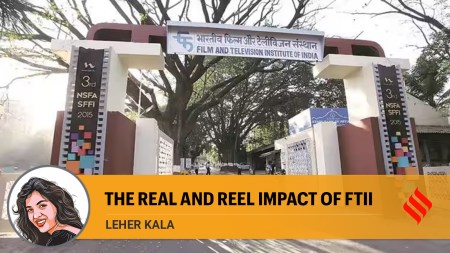
The real and reel impact of FTII Subscriber Only

Naseeruddin Shah interview: 'I’m stuck in mediocrity' Subscriber Only

UPSC Key | Landslides, NGT, Shangri-La dialogue and more Subscriber Only
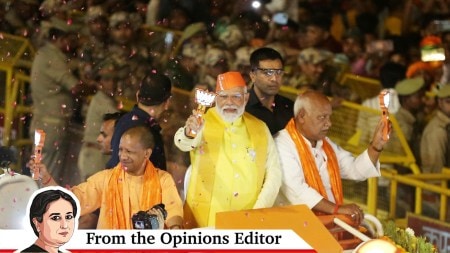
Vandita Mishra writes | Reading the exit polls Subscriber Only

Indian badminton needs to stay patient with Treesa Jolly-Gayatri Gopichand Subscriber Only
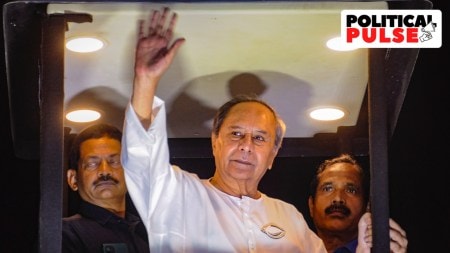
Why BJP keeps raising Naveen Patnaik’s health Subscriber Only

After a wedding kiss in Hapur, a full-blown brawl & Subscriber Only
- UPSC Civil Services
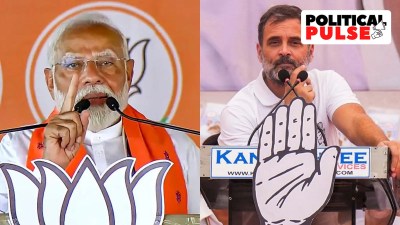
The BJP aims to maintain its dominance in the Lok Sabha results by repeating its 2019 performance, where it won 224 seats with over 50% of the vote share. Its strong presence in states like Uttar Pradesh, Gujarat, Delhi, and Rajasthan played a crucial role in this victory. However, there were also 186 seats with a narrow winning margin of less than 10%.
- Maharashtra Election Results 2024 Live: Congress emerges as largest party in state; Union Minister Narayan Rane wins Ratnagiri-Sindhudurg 32 mins ago
- Election Results 2024 Live Updates: ‘Historic feat… people of India have placed faith in NDA for third consecutive time’, says PM Modi 33 mins ago
- Lok Sabha Election Result 2024 Live: Kangana Ranaut announces her victory in Mandi; Shatrughan Sinha wins in Asansol; Arun Govil wins in Meerut 34 mins ago
- West Bengal Election Results 2024 Live Updates: 'Modi should resign,' Mamata slams PC 35 mins ago

Best of Express

Buzzing Now

Jun 04: Latest News
- 01 Iran’s acting top diplomat dismisses US-proposed Gaza cease-fire deal in visit to Lebanon
- 02 BJP turning jantantra into mann-tantra, people ready for naya andolan: Akhilesh Yadav
- 03 Greek’s far-right leader to return to prison after judges rescind his early release
- 04 Kylian Mbappe completes transfer to Real Madrid, posts photo with boyhood hero Cristiano Ronaldo: ‘Club of my dream’
- 05 MVA banks on Baramati, Pune with eye on state polls, Mahayuti confident of winning all 4
- Elections 2024
- Political Pulse
- Entertainment
- Movie Review
- Newsletters
- Web Stories
- IAS Preparation
- UPSC Preparation Strategy
- Topic Wise Essay Questions From UPSC Mains 1994 2018
Last 25 Years Topic-wise Essay Questions From UPSC Mains (1994 - 2018)
Paper I of the UPSC Civil Services mains exam is the Essay. Here, prelims-qualified IAS aspirants have to write two essays out of a few given topics. The paper is for a total of 250 marks and its marks are taken into consideration for the Final Merit List. In this article, we have listed all the essay topics asked in the UPSC mains exam from 1994 to 2018. We have also classified the last 25 years essay questions into topics to make your preparation easier.
Latest – See the UPSC Essay Topics in the IAS Mains 2020 Essay Paper. Download UPSC Mains 2020 Essay Paper from the linked article.
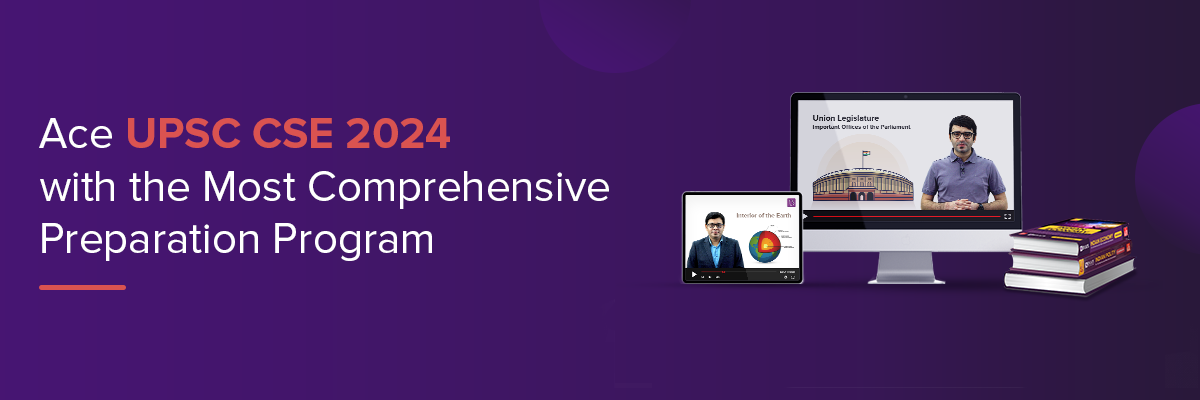
Explore The Ultimate Guide to IAS Exam Preparation
Download The E-Book Now!

UPSC Essay Topics
Administration.
- Politics, bureaucracy and business – fatal triangle. (1994)
- Politics without ethics is a disaster. (1995)
- The VIP cult is a bane of Indian democracy. (1996)
- Need for transparency in public administration. (1996)
- The country’s need for a better disaster management system. (2000)
- How should a civil servant conduct himself? (2003)
Democracy/India since independence
- Whither Indian democracy? (1995)
- What we have not learnt during fifty years of independence. (1997)
- Why should we be proud of being Indians? (2000)
- What have we gained from our democratic set-up? (2001)
- How far has democracy in India delivered the goods? (2003)
- National identity and patriotism. (2008)
- In the context of Gandhiji’s views on the matter, explore, on an evolutionary scale, the terms ‘Swadhinata’, ‘Swaraj’ and ‘Dharmarajya’. Critically comment on their contemporary relevance to Indian democracy. (2012)
- Is the colonial mentality hindering India’s success? (2013)
- Dreams which should not let India sleep. (2015)
- Management of Indian border disputes – a complex task. (2018)
Economic growth and development
- Resource management in the Indian context. (1999)
- GDP (Gross Domestic Product) along with GDH (Gross Domestic Happiness) would be the right indices for judging the wellbeing of a country. (2013)
- Was it the policy paralysis or the paralysis of implementation which slowed the growth of our country? (2014)
- Crisis faced in India – moral or economic. (2015)
- Near jobless growth in India: An anomaly or an outcome of economic reforms. (2016)
- Digital economy: A leveller or a source of economic inequality. (2016)
- Innovation is the key determinant of economic growth and social welfare. (2016)
- Impact of the new economic measures on fiscal ties between the union and states in India. (2017)
Federalism, Decentralisation
- The language problem in India: its past, present and prospects. (1998)
- Water resources should be under the control of the central government. (2004)
- Evaluation of panchayati raj system in India from the point of view of eradication of power to people. (2007)
- Is autonomy the best answer to combat balkanization? (2007)
- Creation of smaller states and the consequent administrative, economic and developmental implication. (2011)
- Cooperative federalism: Myth or reality. (2016)
- Water disputes between States in federal India. (2016)
Indian Culture & Society
- The Indian society at the crossroads. (1994)
- New cults and godmen: a threat to traditional religion. (1996)
- The composite culture of India. (1998)
- Youth culture today. (1999)
- Modernism and our traditional socio-ethical values. (2000)
- Indian culture today: a myth or a reality? (2000)
- As civilization advances culture declines. (2003)
- From traditional Indian philanthropy to the gates-buffet model-a natural progression or a paradigm shift? (2010)
- Judicial activism. (1997)
- Judicial activism and Indian democracy. (2004)
- Justice must reach the poor. (2005)
Social justice/Poverty
- Reservation, politics and empowerment. (1999)
- Food security for sustainable national development. (2005)
- The focus of health care is increasingly getting skewed towards the ‘haves’ of our society. (2009)
- Farming has lost the ability to be a source of subsistence for the majority of farmers in India. (2017)
- Poverty anywhere is a threat to prosperity everywhere. (2018)
Media & Society
- Misinterpretation and misuse of freedom in India. (1998)
- Mass media and cultural invasion. (1999)
- Responsibility of media in a democracy. (2002)
- How has satellite television brought about cultural change in Indian mindsets? (2007)
- Role of media in good governance. (2008)
- Does Indian cinema shape our popular culture or merely reflect it? (2011)
- Is sting operation an invasion on privacy? (2014)
Environment/Urbanisation
- Urbanization is a blessing in disguise. (1997)
- Protection of ecology and environment is essential for sustained economic development. (2006)
- Urbanisation and its hazards. (2008)
- Should a moratorium be imposed on all fresh mining in tribal areas of the country? (2010)
- We may brave human laws but cannot resist natural laws. (2017)
Economic sectors/MNCs
- Multinational corporations – saviours or saboteurs. (1994)
- Globalization would finish small-scale industries in India. (2006)
- BPO boom in India. (2007)
- Special economic zone: boon or bane? (2008)
- Are our traditional handicrafts doomed to a slow death? (2009)
- Is the criticism that the Public-Private-Partnership (PPP) model for development is more of a bane than a boon in the Indian context, justified? (2012)
- Tourism: Can this be the next big thing for India? (2014)
- Restructuring of Indian education system. (1995)
- Literacy is growing very fast, but there is no corresponding growth in education. (1996)
- Irrelevance of the classroom. (2001)
- Privatization of higher education in India. (2002)
- Modern technological education and human values. (2002)
- What is real education? (2005)
- “Education for all” campaign in India: myth or reality. (2006)
- Independent thinking should be encouraged right from the childhood. (2007)
- Is an egalitarian society possible by educating the masses? (2008)
- Credit – based higher education system – status, opportunities and challenges. (2011)
- Is the growing level of competition good for the youth? (2014)
- Are the standardized tests good measure of academic ability or progress? (2014)
- Education without values, as useful as it is, seems rather to make a man more clever devil. (2015)
- Destiny of a nation is shaped in its classrooms. (2017)
- The new emerging women power: the ground realities. (1995)
- Greater political power alone will not improve women’s plight. (1997)
- Woman is god’s best creation. (1998)
- Women empowerment: challenges and prospects. (1999)
- Empowerment alone cannot help our women. (2001)
- Whither women’s emancipation? (2004)
- If women ruled the world. (2005)
- The hand that rocks the cradle. (2005)
- Women’s reservation bill would usher in empowerment for women in India. (2006)
- Managing work and home – is the Indian working woman getting a fair deal? (2012)
- If development is not engendered, it is endangered. (2016)
- Fulfillment of ‘new woman’ in India is a myth. (2017)
Quotes-based/Philosophy
- Youth is a blunder, manhood a struggle, old age a regret. (1994)
- Useless life is an early death. (1994)
- Disinterested intellectual curiosity is the lifeblood of civilisation. (1995)
- When money speaks, the truth is silent. (1995)
- Our deeds determine us, as much as we determine our deeds. (1995)
- Truth is lived, not taught. (1996)
- True religion cannot be misused. (1997)
- Search for truth can only be a spiritual problem. (2002)
- The paths of glory lead but to the grave. (2002)
- If youth knew, if age could. (2002)
- There is nothing either good or bad but thinking makes it so. (2003)
- Be the change you want to see in others. (2013)
- With greater power comes greater responsibility. (2014)
- Words are sharper than the two-edged sword. (2014)
- Lending hands to someone is better than giving a dole. (2015)
- “The past’ is a permanent dimension of human consciousness and values. (2018)
- Reality does not conform to the ideal, but confirms it. (2018)
- Attitude makes habit, habit makes character and character makes a man. (2007)
- Discipline means success, anarchy means ruin. (2008)
- Character of an institution is reflected in its leader. (2015)
- Need brings greed, if greed increases it spoils breed. (2016)
- Joy is the simplest form of gratitude. (2017)
- A good life is one inspired by love and guided by knowledge. (2018)
- A people that values its privileges above its principles loses both. (2018)
- Customary morality cannot be a guide to modern life. (2018)
Globalisation
- Modernisation and westernisation are not identical concepts. (1994)
- The world of the twenty-first century. (1998)
- The implications of globalization for India. (2000)
- My vision of an ideal world order. (2001)
- The masks of new imperialism. (2003)
- Globalizations and its impact on Indian culture. (2004)
- ‘Globalization’ vs. ‘nationalism’. (2009)
- Preparedness of our society for India’s global leadership role. (2010)
Science & Tech
- The modern doctor and his patients. (1997)
- Value-based science and education. (1999)
- The march of science and the erosion of human values. (2001)
- Spirituality and scientific temper. (2003)
- The lure of space. (2004)
- Science and Mysticism: Are they compatible? (2012)
- Science and technology is the panacea for the growth and security of the nation. (2013)
- Technology cannot replace manpower. (2015)
- Alternative technologies for a climate change resilient India. (2018)
Internet/IT
- The cyberworld: its charms and challenges. (2000)
- Increasing computerization would lead to the creation of a dehumanized society. (2006)
- Cyberspace and Internet: Blessing or curse to the human civilization in the long run. (2016)
- Social media is inherently a selfish medium. (2017)
International organisations/relations
- Restructuring of UNO reflect present realities. (1996)
- India’s role in promoting ASEAN cooperation. (2004)
- Importance of Indo-US nuclear agreement. (2006)
- Has the Non- Alignment Movement (NAM) lost its relevance in a multipolar world. (2017)
- Terrorism and world peace. (2005)
- Are we a ‘soft’ state? (2009)
- Good fences make good neighbours. (2009)
- In the Indian context, both human intelligence and technical intelligence are crucial in combating terrorism. (2011)
Miscellaneous
- India’s contribution to world wisdom. (1998)
- The pursuit of excellence. (2001)
- Geography may remain the same; history need not. (2010)
- Fifty Golds in Olympics: Can this be a reality for India? (2014)
- Quick but steady wins the race. (2015)
When preparing for IAS Mains, aspirants must focus on UPSC Mains Answer Writing Practise as this will improve one’s speed, efficiency and writing skills. It will automatically help in essay writing as well.
Also, read:
Frequently Asked Questions on UPSC Essay Topics for UPSC Mains
Q 1. how can i write a good essay in upsc, q 2. does handwriting matter in upsc.

Leave a Comment Cancel reply
Your Mobile number and Email id will not be published. Required fields are marked *
Request OTP on Voice Call
Post My Comment
Please share all essay mains paper for UPSC ?
Hi Download UPSC Question Papers from the linked article.
IAS 2024 - Your dream can come true!
Download the ultimate guide to upsc cse preparation, register with byju's & download free pdfs, register with byju's & watch live videos.

45,000+ students realised their study abroad dream with us. Take the first step today
Meet top uk universities from the comfort of your home, here’s your new year gift, one app for all your, study abroad needs, start your journey, track your progress, grow with the community and so much more.

Verification Code
An OTP has been sent to your registered mobile no. Please verify

Thanks for your comment !
Our team will review it before it's shown to our readers.

21 Best Proverbs for Essay Writing (with Meaning) for Students

- Updated on
- Jun 3, 2024

Do you know what makes the English-speaking skills of a native speaker so fluent? It is their proficiency in using English grammar tools such as idioms, phrases, and proverbs effortlessly. Although the three are often confused with each other, especially idioms and proverbs, upgrading your knowledge of proverbial phrases not only advances your vocabulary but also comes in handy while doing essay writing in any language proficiency test or competitive examination . Therefore, in this blog, you will get to learn powerful sayings packed with meaning for crafting impactful essays at par with a journalist.
This Blog Includes:
Why proverbs for essay writing is important, 7 most commonly used proverbs for essay writing in english, 7 quotes and proverbs for essay – upsc , useful proverbs for gre essay writing.
Must Read: 100+ Common Proverbs with Meaning and Examples
There is no denying that proverbs for essays can be your ticket to academic excellence. These wise sayings or proverbs go beyond decoration; they bolster arguments with historical weight and add depth to analysis, making you shine in both high school essays and the GRE exam . Infact, if you plan to appear for the prestigious Indian qualifying exam, UPSC, using proverbs will showcase your cultural awareness and critical thinking skills.
Since proverbs are infamous for conveying complex ideas succinctly and memorably, here are the seven most common proverbs to use in essays, showcasing your profound knowledge of the English language.
UPSC essays demand clear thinking, strong arguments, and insightful analysis. Here are 7 quotes and proverbs to elevate your writing and impress examiners:
“The future depends on what you do today.” – Mahatma Gandhi
Meaning: This quote emphasises the importance of action and taking responsibility for shaping the future. It can be used to discuss topics like social change, environmental sustainability, or individual agency.
“A single conversation with a wise man is worth a month’s study of books.” – Confucius
Meaning: This proverb highlights the value of learning from experienced individuals. It can be used to discuss the importance of mentorship, cultural exchange, or traditional knowledge systems.
“Education is the most powerful weapon which you can use to change the world.” – Nelson Mandela
Meaning: This quote emphasises the transformative power of education. It can be used to discuss topics like poverty alleviation, women’s empowerment, or educational reforms.
“Justice is what love looks like in public.” – Cornel West
Meaning: This quote connects justice with compassion and empathy. It can be used in essays about social justice, ethical leadership, or the role of government.
“Doubt is not a pleasant condition, but certainty is absurd.” – Voltaire
Meaning: This quote highlights the importance of critical thinking and staying open to new information. It can be used to discuss scientific progress, philosophical inquiry, or the need for evidence-based policymaking.
“The greatest glory in living lies not in never falling, but in rising every time we fall.” – Nelson Mandela
Meaning: This quote highlights the importance of resilience and overcoming challenges. It can be used to discuss individual perseverance, national development, or overcoming historical injustices.
“Small deeds done are better than great deeds planned.” – Peter Marshall
Meaning: This proverb emphasises the importance of taking action, even if the steps are small. It can be used to discuss topics like entrepreneurship, community development, or individual initiative.
Quick Read: 9 Best English Proverbs on Education
Just like UPSC essays, crafting a compelling GRE essay requires strong arguments and insightful analysis. Proverbs, those timeless nuggets of wisdom, can be powerful tools in your GRE essay arsenal. Here are some impactful proverbs to elevate your writing:
Find more proverbial reads below!
This was all about proverbs for essay writing and their meaning. Hope you understand the concept and know how to proceed. You can also follow the Learn English page of Leverage Edu for more exciting and informative blogs related to grammar.
Harshita is a creative writer cum literature enthusiast in pursuit to extend her learnings of overseas and Indian education sectors to the masses, through her well-curated articles. You may also find her emerging in prose writing or reading Toni Morrison when not writing stuff related to education.
Leave a Reply Cancel reply
Save my name, email, and website in this browser for the next time I comment.
Contact no. *

Leaving already?
8 Universities with higher ROI than IITs and IIMs
Grab this one-time opportunity to download this ebook
Connect With Us
45,000+ students realised their study abroad dream with us. take the first step today..

Resend OTP in

Need help with?
Study abroad.
UK, Canada, US & More
IELTS, GRE, GMAT & More
Scholarship, Loans & Forex
Country Preference
New Zealand
Which English test are you planning to take?
Which academic test are you planning to take.
Not Sure yet
When are you planning to take the exam?
Already booked my exam slot
Within 2 Months
Want to learn about the test
Which Degree do you wish to pursue?
When do you want to start studying abroad.
January 2024
September 2024
What is your budget to study abroad?

How would you describe this article ?
Please rate this article
We would like to hear more.
Have something on your mind?

Make your study abroad dream a reality in January 2022 with
India's Biggest Virtual University Fair

Essex Direct Admission Day
Why attend .

Don't Miss Out

- OUR CENTERS Bangalore Delhi Lucknow Mysuru Srinagar Dharwad Hyderabad
Call us @ 08069405205

Search Here

- An Introduction to the CSE Exam
- Personality Test
- Annual Calendar by UPSC-2024
- Common Myths about the Exam
- About Insights IAS
- Our Mission, Vision & Values
- Director's Desk
- Meet Our Team
- Our Branches
- Careers at Insights IAS
- Daily Current Affairs+PIB Summary
- Insights into Editorials
- Insta Revision Modules for Prelims
- Current Affairs Quiz
- Static Quiz
- Current Affairs RTM
- Insta-DART(CSAT)
- Insta 75 Days Revision Tests for Prelims 2024
- Secure (Mains Answer writing)
- Secure Synopsis
- Ethics Case Studies
- Insta Ethics
- Weekly Essay Challenge
- Insta Revision Modules-Mains
- Insta 75 Days Revision Tests for Mains
- Secure (Archive)
- Anthropology
- Law Optional
- Kannada Literature
- Public Administration
- English Literature
- Medical Science
- Mathematics
- Commerce & Accountancy
- Monthly Magazine: CURRENT AFFAIRS 30
- Content for Mains Enrichment (CME)
- InstaMaps: Important Places in News
- Weekly CA Magazine
- The PRIME Magazine
- Insta Revision Modules-Prelims
- Insta-DART(CSAT) Quiz
- Insta 75 days Revision Tests for Prelims 2022
- Insights SECURE(Mains Answer Writing)
- Interview Transcripts
- Previous Years' Question Papers-Prelims
- Answer Keys for Prelims PYQs
- Solve Prelims PYQs
- Previous Years' Question Papers-Mains
- UPSC CSE Syllabus
- Toppers from Insights IAS
- Testimonials
- Felicitation
- UPSC Results
- Indian Heritage & Culture
- Ancient Indian History
- Medieval Indian History
- Modern Indian History
- World History
- World Geography
- Indian Geography
- Indian Society
- Social Justice
- International Relations
- Agriculture
- Environment & Ecology
- Disaster Management
- Science & Technology
- Security Issues
- Ethics, Integrity and Aptitude

- Indian Heritage & Culture
- Enivornment & Ecology

UPSC Mains Answer Writing Practice – Insights SECURE : 29 April 2024
Click on EACH question to post/upload you answers.
How to Follow Secure Initiative?
How to self-evaluate your answer , mission – 2023: yearlong timetable, join ipm 4.0 to get an assured review of 2 secure answers everyday, general studies – 1.
Topic: Social empowerment
1. Female Bhakti saints in medieval India made significant contributions to religious, social, and cultural spheres. Discuss. (150 words)
Difficulty level: Moderate
Reference: Indian Express , Insights on Inia
Why the question: The article explains that three mediaeval women saints stand particularly tall in the Indian faithscape – Mirabai, Akka Mahadevi and Lal Ded. Key Demand of the question: To write about the contributions of female bhakti saints of India during the medieval period. Directive word: Examine – When asked to ‘Examine’, we must investigate the topic (content words) in detail, inspect it, investigate it and establish the key facts and issues related to the topic in question. While doing so we should explain why these facts and issues are important and their implications. Structure of the answer: Introduction: Start by giving context about Female saints during Bhakti period. Body: First, write about the contributions of female bhakti saints- popularized the Bhakti movement through their songs and teachings, challenging social norms and advocating for equality and empowerment of women, enriched regional traditions, while their advocacy for social justice and spiritual leadership left a lasting legacy. Cite examples to substantiate. Conclusion: Conclude by summarising.
Topic: Distribution of key natural resources across the world (including South Asia and the Indian sub-continent);
2. Sundarbans, are one of the most biologically diverse areas in the world. Its resource richness is unparalleled, making it an invaluable ecological asset. Discuss the resource richness and major issues faced by the Sundarbans. (250 words)
Reference: Down to Earth , Insights on India.
Why the question: The article explains that for most of the world, the Sundarbans evoke a sense of awe for their flora and fauna. Key Demand of the question: To write about the resource richness of Sundarbans and issues it faces. Directive word: Examine – When asked to ‘Examine’, we must investigate the topic (content words) in detail, inspect it, investigate it and establish the key facts and issues related to the topic in question. While doing so we should explain why these facts and issues are important and their implications. Structure of the answer: Introduction: Start by giving context about Sundarbans. Body: First, write about the resource richness of Sundarbans – Bay of Bengal delta, boasts unparalleled biodiversity and invaluable resources, mangrove forests, diverse flora and fauna, serve as a crucial habitat for endangered species like the Bengal tiger and saltwater crocodile, supports thriving fisheries, sustains local livelihoods, and attracts tourists with its scenic beauty etc. Next, explain the concerns in the region – Climate change, deforestation, pollution, poaching, and human-wildlife conflicts are pressing issues. Next, discuss the efforts that are needed to be taken in this direction. Conclusion: Conclude with way forward.
Topic: Important Geophysical phenomena such as earthquakes, Tsunami, Volcanic activity, cyclone etc., geographical features and their location-changes in critical geographical features (including water-bodies and ice-caps) and in flora and fauna and the effects of such changes.
3. Examine the reasons behind the increasing frequency of forest fires in India. What role is climate change playing in exacerbating the forest fire risk? (250 words)
Reference: Indian Express
Why the question: The article explains the recent forest fires that occurred in Goa, India, in March 2023. It describes the causes and impact of the fires, which destroyed large areas of forest and wildlife habitats. Key Demand of the question: To write about causes of forest fires in India and measures need to mitigate them. Directive word: Examine – When asked to ‘Examine’, we must investigate the topic (content words) in detail, inspect it, investigate it and establish the key facts and issues related to the topic in question. While doing so we should explain why these facts and issues are important and their implications. Structure of the answer: Introduction: Start by defining forest fires and statistic regarding rising instances of forest fires in India. Body: Draw a small illustrative diagram showing major forest fire prone areas. Discuss first the reasons of forest fires; Thunderstorms are the most likely natural cause for forest fires. Slash and burn techniques etc. Write about the role of climate change in rising instances of forest fires. Next, explain the concerns posed by it. Explain why they are difficult to control. Next, discuss the efforts that are needed to be taken in this direction. Conclusion: Conclude with way forward.
General Studies – 3
Topic: Challenges to internal security through communication networks, role of media and social networking sites in internal security challenges
4. The dissemination of rumours via fabricated news has the potential to generate significant social unrest within a nation and present a threat to its internal security. Analyse. (250 words)
Difficulty level: Easy
Reference: Insights on India/
Why the question: The question is part of the static syllabus of General studies paper – 3 and mentioned as part of Mission-2024 Secure timetable. Key Demand of the question: To write about the threats posed by disinformation and ways to tackle it. Directive: Analyse – When asked to analyse, you must examine methodically the structure or nature of the topic by separating it into component parts and present them in a summary. Structure of the answer: Introduction: Begin by giving the context of spread of misinformation in the digital age. Body: First, write about the various political, economic and social consequences of the spread of misinformation and fake news. Substantiate with examples. Next, write about how the above can compromise national security. Next, write about the measures that are needed to tackle the above. Conclusion: Conclude by writing a way forward.
Topic: money laundering and its prevention.
5. Cryptocurrencies can make it easy to obscure the source of criminal proceeds and are increasingly becoming the preferred currency because cryptocurrency offers a combination of anonymity, ease of use and the ability to circumvent international borders and regulations, in essence, to launder the ill-gotten proceeds. Examine. (250 words)
Reference: Insights on India
Why the question: The question is part of the static syllabus of General studies paper – 3 and mentioned as part of Mission-2024 Secure timetable. Key Demand of the question: To write about how cryptocurrency has facilitated money laundering and measures needed to prevent it. Structure of the answer: Introduction: Start by giving context regarding the challenges posed by cryptocurrency. Body: First, explain in detail as to how crypto can facilitate money laundering and challenges it poses for the enforcement agencies to tack and analyse it. Next, write about the measures that are needed to ensure this growing technology is regulated and challenges associated with it are overcome. Conclusion: Conclude by summarising.
General Studies – 4
Topic: Human Values – lessons from the lives and teachings of great leaders, reformers and administrators;
6. What does this quote means to you? (150 words)
“It is our moral failure that we still tolerate poverty” – Ela Bhatt
Why the question: The question is part of the static syllabus of General studies paper – 4. Structure of the answer: Introduction: Begin by explaining the literal meaning of the quote. Body: Write about how prevalence and tolerance of poverty is moral failure of the society and why it displays a lack of compassion and altruism. Mention the values that must be promoted to end poverty. Conclusion: Summarise by highlighting the importance of the quote in the present day.
7. What does this quote means to you? (150 words)
“One’s life has value so long as one attributes value to the life of others.” ― Simone de Beauvoir
Why the question: The question is part of the static syllabus of General studies paper – 4. Structure of the answer: Introduction: Begin by explaining the literal meaning of the quote. Body: Write about how one can generate value in his/her life by creating or generating value in others life or contribution to the happiness of others. Cite examples to substantiate wherein people to served others added value to their own life. Conclusion: Summarise by highlighting the importance of the quote in the present day.
Click here to Download the SECURE Questions in PDF Format
Join our Official Telegram Channel HERE
Please subscribe to Our podcast channel HERE
Subscribe to our YouTube Channel HERE
Follow our Twitter Account HERE
Follow our Instagram ID HERE
Follow us on LinkedIn : HERE

- Our Mission, Vision & Values
- Director’s Desk
- Commerce & Accountancy
- Previous Years’ Question Papers-Prelims
- Previous Years’ Question Papers-Mains
- Environment & Ecology
- Science & Technology

COMMENTS
UPSC Calendar 2025 Final Result - Civil Services Examination 2023 UPSC IFOS Notification - 2024 UPSC CSE Notification 2024. close. Home; ... Mains Answer Writing Practice; Essay. Essay Strategy; Fodder For Essay; Model Essays; Previous Years Papers; Ethics. Ethics Strategy; Ethics Case Studies; Engage in Ethics;
WEEKLY UPSC IAS ESSAY WRITING CHALLENGES - 2022. December 25, 2022 : To tolerate is purely an act of mind. December 18, 2022 : The arc of moral universe is long, but it bends towards justice. December 11, 2022 : Religion is a culture of faith; Science is a culture of doubt.
For the CSE essay paper, two essays have to be written under 3 hours in the 1000-1200 word limit. Each essay carries 125 marks for a total of 250. The essay paper is divided into two sections - A and B, each carrying a choice of 4 essays each, and the aspirant has to choose only one essay from each section.
How to conclude an Essay My notes, quote collection and sample essays What UPSC says about the essay paper "Candidates may be required to write essays on multiple topics. They will be expected to keep closely to the subject of the essay, to arrange their ideas in an orderly fashion, and to write concisely.
In the UPSC mains examination, essay paper is worth 250 marks and three hours. Here is the topic wise questions from the earlier years for the benefit of civil service IAS IPS aspirants. 1 India: Democracy, administration, Society, culture. 1.1 India Since Independence. 1.2 Federalism, Decentralization.
As the essay paper is out of 250, marks which are above 50% can be considered good, ie. 125. Marks between 110-125 is considered as average. Marks in the range of 150-160 are possible for exceptional essays. Note: UPSC may award poorly written essay marks as low as '0' or '20'.
UPSC conducted the Essay Paper, as part of the Civil Services Main Exam 2021 on 07-01-2022. There were 8 Essay topics, out of which candidates were asked to write on two topics in 3 hours. Candidates were supposed to answer about 1000 words for each essay (about 10-12 pages).
Selection of topic is the key for scoring in essay writing. Around 15 to 20 minutes can be spent on choosing best topic. we also needs to be sure about the flow of thought, rich facts and figures, history, analytical expression and all to be collectively rated high in the selected topic. It impacts your marks.
Essay Writing for UPSC. The UPSC Mains Examination comprises a total of nine papers, inclusive of an essay paper. The Essay Paper is categorised into sections A and B, each containing four topics. These topics hold a value of 125 marks each, thereby totalling 250 marks (125×2). Candidates are required to choose one topic from each section and ...
The Essay Paper is one of the nine papers in the UPSC civil services mains exam. In this paper, you will have to write two essays, each with a word count of 1000-1200. One topic can be selected from a choice of four topics. The Essay Paper is for a total of 250 marks, with one essay for 125 marks.
The Significance of Essay Writing in the UPSC Examination Through the Essay Paper, the UPSC peaks into the knowledge and interest of the aspirant over a variety of topics. Additionally, it evaluates an aspirants' analytical skills, articulation of thoughts and expression of ideas in a coherent and logical manner. In other words, the ability to
Please find the questions in the Essay Paper of the UPSC 2022 Civil Services Mains Examination (written). UPSC conducted the Essay Paper, as part of the Civil Services Main Exam 2022 on 16-09-2022. The question paper was not as shocking as last year. There were 8 Essay topics, out of which candidates were asked to write on two topics in 3 hours.
How to conclude an Essay; My notes, quote collection and sample essays; What UPSC says about the essay paper "Candidates may be required to write essays on multiple topics. They will be expected to keep closely to the subject of the essay, to arrange their ideas in an orderly fashion, and to write concisely.
Here are some UPSC Essay Topics on Science and Technology: Deglobalisation is good for the world. Science is organised Knowledge. Wisdom is Organised life. Technology is a Weapon against Poverty. Prioritising Education Technology for Global Growth. Technology is the silent factor in International Relations.
Home » UPSC Mains: Syllabus, Question Papers, Mock Tests, Art of Answer Writing. Mains GS Papers Topicwise from 2013-2023. Mrunal's Model Answers for UPSC GSM-2020 Paper. Mains GS Paper1: History, Social Science, Geography. Mains GS Paper2: Polity, Governance,International Relation. Mains GS Paper3: Economy, Environment, Sci-Tech, Internal ...
An academic essay is a formal piece of writing with a clear structure. This is the one paper for which you will find excellent advice all over the internet — mostly on university websites — so make sure to read them up instead of just relying on the typical UPSC resources.
The style, presentation and content of essays vary as per the purpose and targeted audience. Essay writing is an important component of various competitive examinations. However, we will focus our strategy on the kind of essay which is to be written in the Essay paper of the Civil Services Main Examination conducted by the UPSC.
Last 25 Years Topic-wise Essay Questions From UPSC Mains (1994 - 2018) Paper I of the UPSC Civil Services mains exam is the Essay. Here, prelims-qualified IAS aspirants have to write two essays out of a few given topics. The paper is for a total of 250 marks and its marks are taken into consideration for the Final Merit List.
UPSC Essay paper is one paper where you can get more output with little effort with the right strategy. The right strategy consists a clear structure, right thesis, better practice and the best guidance. Keeping this in mind, Vision IAS has created a unique Essay Enrichment Programme for civil services. This programme would consist of 5 classes ...
Reach Us 12, Main AB Road, Bhawar Kuan, Indore, Madhya Pradesh, 452007 641, 1 st Floor, Mukherjee Nagar, Delhi-110009 ; 21, Pusa Rd, WEA, Karol Bagh, Delhi-110005
UPSC essays demand clear thinking, strong arguments, and insightful analysis. Here are 7 quotes and proverbs to elevate your writing and impress examiners: "The future depends on what you do today.". - Mahatma Gandhi. Meaning: This quote emphasises the importance of action and taking responsibility for shaping the future.
Reach Us 12, Main AB Road, Bhawar Kuan, Indore, Madhya Pradesh, 452007 641, 1 st Floor, Mukherjee Nagar, Delhi-110009 ; 21, Pusa Rd, WEA, Karol Bagh, Delhi-110005
Sample Essay - Balaji D K IAS Rank - 36, CSE-2014. Balaji (Read his story Here) got 70 marks in his Essay paper in his first Mains (first attempt). In his second attempt, after writing many essays before the exam, he has got 138 marks. He has doubled his marks through rigorous practice. Essay plays an important role in deciding one's rank.
The question is part of the static syllabus of General studies paper - 4. Structure of the answer: Introduction: Begin by explaining the literal meaning of the quote. Body: Write about how prevalence and tolerance of poverty is moral failure of the society and why it displays a lack of compassion and altruism.
UPSC Calendar 2025 Final Result - Civil Services Examination 2023 UPSC IFOS Notification - 2024 UPSC CSE Notification 2024. close. Home; ... Mains Answer Writing Practice; Essay. Essay Strategy; Fodder For Essay; Model Essays; Previous Years Papers; Ethics. Ethics Strategy; Ethics Case Studies; Engage in Ethics;